CONNECTION
WHAT TO READ NEXT IN INDEPENDENT PUBLISHING


WHAT TO READ NEXT IN INDEPENDENT PUBLISHING

All we wanted was a really good magazine. About books. That was full of the really great stuff. So we made it. And we really like it. And we hope you do, too. Because we’re just getting started.




“A self-deprecating memoir, beautifully deppicting the intricacies of Chinese culture and the timeless search for where one truly belongs”
Shelf Unbound’s 2022 Overall Best Indie Book Winner
PRESIDENT, EDITOR IN CHIEF
Sarah Kloth
PARTNER, PUBLISHER
Debra Pandak
DIGITAL DESIGNER
Corinna Kloth
CONTRIBUTING EDITOR
Christian Brown
Alyse Mgrdichian
Gabriella Guerra
Wyatt Bandt
Christina Consolino
Michele Mathews
Anthony Carinhas
FINANCE MANAGER
Jane Miller
For Advertising Inquiries: e-mail sarah@shelfmediagroup.com
For editorial inquiries: e-mail media@shelfmediagroup.com
2003: THE TIME-LOOP DEVICE

Nolan Emerson, PhD, is a brilliant young theoretical and experimental physicist who is a professor at the University of Geneva, and the lead scientist at the CERN particle accelerator. He is a leader in the areas of general relativity and quantum mechanics. Dr. Emerson devises an experiment so radical and revolutionary that it seeks to unlock the astounding, complex, and mysterious secrets of Einstein’s space-time. Ultimately, his work challenges the fundamental notions of consciousness and of the concept of reality itself.
1918: THE GREAT PANDEMIC

Major Edward Nobel’s mission, as a physician, is to help protect American troops from infectious ailments during the First World War. However, his unique vantage point in Boston allows him to detect an emerging influenza strain that is an unprecedented global threat. Eventually, the 1918 influenza pandemic killed up to 100 million people, and became the worst natural disaster in human history.
1877: A NORTHERN PHYSICIAN IN SOUTHERN UNGOVERNED SPACES
Colonel Charles Noble is a US Civil War veteran, and an Army surgeon reservist. Extreme violence in the former Confederacy, in anticipation of a national election, has caused President Grant to send additional federal troops to the Southern states. Terrorists are determined to counter Noble’s good intentions, as they threaten the civil rights, and the very lives, of all who oppose them.
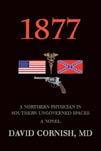
1980: THE EMERGENCE OF HIV LEARN
Dr. Arthur Noble is a brilliant first-year medical resident in San Francisco. Noble encounters a strange new ailment that seemingly appears out of nowhere, and delivers its victims a most horrible merciless death. Dr. Noble struggles to find answers to the medical mystery, even as many researchers and society refuse to believe that it is a serious public health hazard, or that it even exists.

11 Magical Realism & Late Stage Capitalism: An Interview with Wendy Wimmer By Alyse Mgrdichian
20 New Release Roundup By Corinna Kloth

54 Debut Poetry and Thematic Truths in the American South: An Interview with Crystal Wilkinson By Alyse Mgrdichian
66 An Interview with Paul W. Williams, author of Harvard, Hollywood, Hitmen, and Holy Men
88 Writing Children’s Books: How to Connect with Your Audience By Alyse Mgrdichian
92 Interview: Anne Yoder, Author of The Enhancers By Michele Mathews
100 How to Get Plugged into an Indie or Self-Publisher By Wyatt Bandt

Connecting to a story. Connecting to a character. Connecting to an author.
In this issue, we hope you find connection.
We have some interesting interviews with authors Wendy Wimmere, Crystal Wilkinson, Paul W. Williams, and Anne Yoder as we connect with their stories and go deep into the real truth behind their work. Enjoy the issue!



If you enjoyed Bill Bryson’s book, The Life and Times of the Thunderbolt Kid, and Russell Baker’s book, Growing Up, you will thoroughly enjoy the hilarious, coming-ofage, romantic comedy, My Favorite Girlfriend, by Paul Sturm. This humorous and entertaining memoir details how a scrawny, funny-looking, audaciously witty kid leveraged his surprising athletic skills in basketball and his creative imagination in the classroom to become popular. The story is really about romance, identifying the author’s constant desire for a girlfriend, as early as kindergarten.

The story captures the astonishing twists and turns in the author’s romantic relationships and his athletic pursuits, beginning in Park Ridge, New Jersey, as a youth and then at The College of William and Mary. His comical pursuit of love, despite his less than impressive appearance, includes woeful failures with the opposite sex, but some wonderful times, too. After many exciting relationships, would he ever find the girl of his dreams?

That’s just the start of it. The aviation industry is in turmoil, and the U.S. president is off his game. He just shanked his drive into a water hazard on the fourth hole.
Buckle-up for the read of your life. Defined by their individual talents, the good guys serve it up to the villains in this contemporary thriller, involving murder, espionage, and perfidious political power-plays.

This much-loved Aussie author is a perennial winner or finalist in multiple international writing competitions and has acquired 17 awards for 11 of his books.

Gerryburke.net
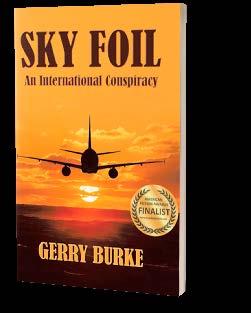


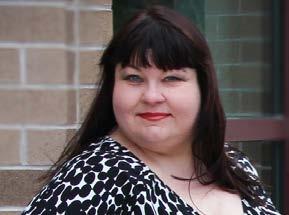 BY ALYSE MGRDICHIAN
BY ALYSE MGRDICHIAN
Writing in an entertaining and compelling way is incredibly difficult – especially when writing short stories, since you have a limited amount of space to work in. I really love short stories because of this, especially those that successfully utilize magical realism (e.g., The Dangers of Smoking in Bed). With this in mind, I was very excited to receive a review copy of Entry Level, Wendy Wimmer’s debut short story collection (published in September 2022 by Autumn House Press). It is an incredibly impressive book, covering a range of themes, and yes … it contains a healthy dose of magical realism. I’m very happy to have had the opportunity to talk with Wendy about her experience writing it. Below you can find the collection’s synopsis, along with our conversation.
Wendy Wimmer’s debut short story collection, Entry Level, contains a range of characters who are trying to find, assert, or salvage their identities. These fifteen stories center around the experience of being underemployed—whether by circumstance, class, gender, race, or other prevailing factors—and the toll this takes on an individual…. Her characters undergo feats of endurance, heartbreak, and loneliness, all while trying to succeed in a world that so often undervalues them. From a young marine biologist suffering from imposter syndrome and a haunting to a bingo caller facing another brutal snowstorm and a creature that may or may not be an angel, Wimmer’s characters are all confronting an oppressive universe that seemingly operates against them or is, at best, indifferent to them. These stories reflect on the difficulties of modern-day survival and remind us that piecing together a life demands both hope and resilience.

WW: I don't think I ever had a choice. For as long as I can remember, I’ve been inventing stories. I was always the quiet kid who could entertain myself in the corner with paper dolls or figurines. I would create intense, multi-generational sagas with these little people, and I would also make dioramas with cardboard and the gravel from my grandmother’s driveway. I was a ghoulish, weird kid. In high school, instead of taking notes in class, I’d be writing stories in my notebook. It’s a great trick – if you write stories in class, you look like a very earnest, conscientious notetaker. Way better than trying to read a comic book under your desk.
By the time college came around, I wasn't sure what my major was going to be. I came from a very blue collar background, so the fact that I was going to college at all was really controversial in my family. I was the first to go, so their expectation was that I was going to do something that was going to make me rich, or
make it so that I didn’t have to work a physical job. But then I surprised them and got an English degree, even though I knew it wasn’t a financially good idea. It just felt right, and it’s what I enjoyed.
After graduating, I got a job in programming and stopped writing completely. I felt like I had to ‘grow up’ and be an adult – after all, everybody has dreams of becoming a writer … I needed to get more realistic. But after programming for years, I started keeping an online diary by coding it into the internet (before blogs were a thing). Like in high school, I would code during work and make it look like I was busy, but I was really just trying to entertain myself during my incredibly boring job. But then I got an audience, and that's when I started realizing that this wasn’t going to let go of me – I was going to keep wanting readers, and I was going to keep wanting to tell the stories that were in my head. Now, after getting an MFA and PhD in writing, I’ve transitioned to making a living from IT Journalism while writing full-time on the side.
WW: I like what I have now –I’m able to test and tease my brain at work without exhausting my creative reserves. Besides, I think I’m too nervous a person to rely on my books for income. People think that, if they get published by one of the Big Five, then they’ll be able to make a career out of their writing, but that form of publication doesn’t guarantee a livable wage. A good friend of mine is on her fourth book, with her work being very well received – but up until last year, she has never made more than $6,000 a year on her writing. People seem to forget that publishing is a business. Publishing houses are making money on your intellectual property, and you get a small percentage of those sales. When my book sells, I get 8%, which is pretty standard for a firsttime author. But I clearly cannot live on 8%, or even 20% if sales are unpredictable. You can’t rely on sporadic checks.
– he’s experiencing a great deal of success, and he’s making enough from his books to support himself, but he’s by no means wealthy. The misperception is that, once you’ve amassed a big enough following, you become a writing superstar with movie deals and six figure checks. But that’s nowhere near true, and it’s good to know that going into the field. In other words, reevaluate your idea of success. When I won the book deal for Entry Level, I had to ask myself, is this the dream? And I said, ‘Yeah, this is the dream. Somebody is in love with my book enough to put it into the hands of readers.’ That's really all that you can ever hope for. The only person you're guaranteed to satisfy is yourself, so if you can write something that satisfies you and somebody else wants to read it, then that's amazing.
Even if you become better known, you’re unlikely to become wealthy from your writing. Like Patrick Rothfuss, who I went to school with
WW: It's a short story collection, so I had the benefit of being able to piece it together, like a quilt. Because of this, some of those stories are quite old. There's one story in there
that I wrote while in undergrad – it was haunting me, so I rewrote it for the collection. There are other stories in there that I wrote literally last summer.
As for theme, I write about the patriarchy and the way that poor people are monetized by late stage capitalism, and also how it feels to be stuck in that system. Am I going to make rent this month? Which bill should I pay, water or heat? I remember being in a similar place when I was 24 – I dislocated my shoulder playing volleyball, and ended up resetting my own shoulder and skipping physical therapy because I didn’t have insurance. That's a reality for a lot of people. Even now when I have to make a doctor’s appointment, I still think, ‘Is this going to be something that bankrupts us?’
I worked at a homeless shelter while in undergrad, which was infuriating because you'd have people there who were working 40 hours a week, yet they needed a homeless shelter to supplement their most basic needs. You’re always told to get a full-time job, then you’ll be okay –
but in reality, that’s not true. You’ll never make enough on minimum wage. And it's not like I live in San Francisco or New York City where it's expensive to live. Many of us are only a few short paychecks away from being in seriously dire straits. But then rich people are giving jobs to people outside of the US and somehow convincing us that it's the immigrants’ fault. And then we’re mad at immigrants or those who have received offshore jobs, rather than being mad at the person who put those jobs offshore in the first place. The analogy I think of are rats in too small of a cage – the rats get mad at each other instead of the person who put them in the cage.
The American myth is that if you’re wealthier or more financially comfortable than your peers, then you’re somehow smarter than those ‘below’ you. But that isn’t true at all – there are absolutely brilliant people making under $30,000 a year. So, long story short, these perspectives are a huge part of what drove the collection for me.
WW: It’s incredibly difficult, especially with short stories (let alone a debut collection), to query or get traditionally published. We can't all be Carmen Maria Machado, who managed to get an agent and a big press off the strength of her collection alone. I had published many of my pieces in independent magazines, but didn’t know where to go from there. So I was very lucky to have author friends, because they were able to guide me through the process. They basically said there's one of two routes – you can either query a novel and short story collection as a ‘two for the price of one’ deal, or you can win a contest. I was trying to do the ‘two for one’ option, but then the pandemic hit. The worst part is that the novel occurs during a pandemic, which was a bit prophetic of me.
So I shifted and began submitting my collection to contests. It was a semifinalist for a few competitions, but then it won the 2021 Autumn House Fiction prize. With that win came a small stipend and publication, which was fantastic – I’ve really loved working with
Autumn House, especially Christine Stroud and her group of editors. We had a good back-and-forth partnership, and it was a really collaborative and supportive operation.
FROM WHAT YOU’VE LEARNED FROM PERSONAL AND PROFESSIONAL EXPERIENCE, WHAT ADVICE WOULD YOU GIVE TO YOUR YOUNGER SELF? AND WHAT ADVICE WOULD YOU GIVE TO YOUNG OR ASPIRING WRITERS?
WW: That’s a great question. This is going to sound so crude, but opinions are like assholes –everybody has one. So don't let somebody else's opinion define your sense of self. It comes back to my point of, you’re the only person you’re ever guaranteed to satisfy. There's literally a billion ideas of what makes for good writing, so nobody's opinion matters more or less than anybody else's. And once you’ve published your work, it leaves your control as a writer, and it’s not fully yours anymore – in a way, it becomes the readers’. How they then experience your book is completely separate from you as the writer.
Some of the best advice I ever got
as a creative was from when I started doing pottery. The master potter who taught me had two pieces of advice. The first was to make 10,000 pots, then break them. It doesn’t matter how good you are – break them all, then keep the 10,001st. Through this process, you learn not to care about the pot. You learn to not get invested in it, because you’re going to break it anyway – the process is what’s important. In thinking like this, you’re freed from all your fears of perfectionism, because it no longer matters if you fuck them up. The second piece of advice he had was that, as an artist, you have to insist, resist, and persist. You have to insist upon your point of view. You have to resist the influences of other people to change your point of view. And you have to persist, meaning you have to figure out a way to live
your life while still continuing to make your art. So yeah, those are my best pieces of advice, straight from Rick McKinney, the master potter in Appleton, Wisconsin.
WW: I’m clearing the pandemic novel right now, so hopefully something will happen with that soon. I’m also working on a multigenerational novel set in Wisconsin in the ‘80s. I’m hoping that the features I’ve received for Entry Level will pique the interest of readers and agents for my future projects.
Wendy Wimmer writes from Wisconsin, under the strict supervision of two dogs and a cat. She holds a Master of Arts and PhD in English from the University of Wisconsin at Milwaukee and the University of Nevada at Las Vegas, respectively. Her work has been published in Barrelhouse, Waxwing, Paper Darts, Believer, ANMLY, Per Contra, Blackbird, and more. She’s currently writing a novel, sipping a latte, and listening to a dog snoring at this very minute.

 by Larry J Hilton
by Larry J Hilton

The author takes the Viennese family of Viktor Baur through the turbulent years of World War I, the difficulties of feeding the family when money was worthless after the war, then followed closely by the Depression with so many people out of work.With all of this going on in Austria, Austrians could look over the border at their German neighbors and see their country improving under Hitler and the Nazis.

Viktor is a successful banker and could see how the German economy was improving and that many Austrians were demanding Anschluss with Germany. However, Viktor was a strong Austrian, who had fought in the Great War and was concerned about the dictatorship with Hitler.
The story then focuses on Viktor’s two children. Fritz and the younger daughter, Elke who are both caught up in the Hitler “magic.” Too often we read about the great events in history and concentrate on the people in power, forgetting that decisions made at high levels in government effect all individuals such as the Baur family.

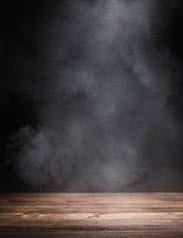
These almost 500 poems are broken down into seven categories: Life, Love, Sin, Sex, Nature, death and God. “Doggerel: Really Bad Poems, is a fresh, unique collection of poems about human life in all its facets. They speak of something personal within each of us…like happiness, sadness, pain, growing older, success, and heartache—even heaven and hell.”
- Reader Views
“…this book is recommended to those who like to delve into the nitty-gritty of existence and the many emotions these experiences can elicit. I would particularly appeal to those who appreciate nononsense writing, and glimpses of lives other than their own.”
- Book Review Directory



Gregg Hurwitz is the New York Times, #1 internationally bestselling author of 22 thrillers, including the Orphan X series, and two awardwinning thriller novels for teens. His novels have won numerous literary awards, graced top ten lists, and have been published in 33 languages. Gregg has written screenplays for or sold spec scripts to many of the major studios (including THE BOOK OF HENRY), and written, developed, and produced television for various networks.
As a child, Evan Smoak was plucked out of a group home, raised and trained as an off-the-books assassin for the government as part of the Orphan program. When he broke with the program and went deep underground, he left with a lot of secrets in his head that the government would do anything to make sure never got out.
When he remade himself as The Nowhere Man, dedicated to helping the most desperate in their times of trouble, Evan found himself slowly back on the government’s radar. Having eliminated most of the Orphans in the program, the government will stop at nothing to eliminate the threat they see in Evan. But Orphan X has always been several steps ahead of his pursuers. Until he makes one little mistake...
Now the President has him in her control and offers Evan a deal - eliminate a rich, powerful man she says is too dangerous to live and, in turn, she’ll let Evan survive. But when Evan left the Program he swore to only use his skills against those who really deserve it. Now he has to decide what’s more important - his principles or his life.
Dana Gioia has been hailed for decades as a master of traditional lyric forms, whose expansive and accessible poems are offerings of rare poignancy and insight. In Meet Me at the Lighthouse, he invites us back to old Los Angeles, where the shabby nightclub of the title beckons us into its noirish immortality. Elsewhere, he laments the once-vibrant neighborhood where he grew up, now bulldozed, and recalls his working-class family of immigrants. Gioia describes a haunting from his mother on his birthday, Christmas Eve. Another poem remembers his uncle, a US Merchant Marine. And “The Ballad of Jesús Ortiz” tells the story of his greatgrandfather, a Mexican vaquero who was shot dead at a tavern in Wyoming during a dispute over a bar tab. “I praise my ancestors, the unkillable poor,” Gioia writes. This book is dedicated to their memory.
Including poems, song lyrics, translations, and concluding with an unsettling train ride to the underworld, Meet Me at the Lighthouse is a luminous exploration of nostalgia, mortality, and what makes a life worth living and remembering.
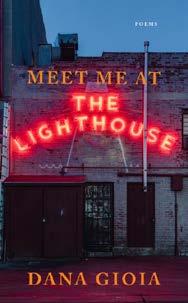
Dana Gioia is an award-winning poet and critic. He has published five celebrated volumes of poetry, including 99 Poems: New & Selected, and three critical collections. For six years he served as Chairman of the National Endowment for the Arts. He is now the Judge Widney Professor of Poetry and Public Culture at the University of Southern California. He is the Poet Laureate of California.

Born in Actopan, Mexico, Yuri Herrera is the author of three novels, including Signs Preceding the End of the World, which was one of theGuardian’s “100 Best Books of the 21st Century” and won the Best Translated Book Award. He teaches at Tulane University in New Orleans.

The characters that populate Yuri Herrera’s surprising new story collection inhabit imagined futures that reveal the strangeness and instability of the present. Drawing on science fiction, noir, and the philosophical parables of Jorge Luis Borges’s Fictions and Italo Calvino’s Cosmicomics, these very short stories are an inspired extension of this significant writer’s work.
In Ten Planets, objects can be sentient and might rebel against the unhappy human family to which they are attached. A detective of sorts finds clues to buried secrets by studying the noses of his clients, which he insists are covert maps. A meager bacterium in a human intestine gains consciousness when a psychotropic drug is ingested. Monsters and aliens abound, but in the fiction of Yuri Herrera, knowing who is the monster and who the alien is a tricky proposition.
In Ten Planets, Herrera’s consistent themes—the mutability of borders, the wounds and legacy of colonial violence, and a deep love of storytelling in all its forms—are explored with evident brilliance and delight.


Voyager begins with Nona Fernández accompanying her elderly mother to the doctor to seek an explanation for her frequent falls and inability to remember what preceded them. As the author stares at the image of her mother’s brain scan, it occurs to her that the electrical signals shown on the screen resemble the night sky.
Inspired by the mission of the Voyager spacecrafts, Fernández begins a process of observation and documentation. She describes a recent trip to the remote Atacama desert—one of the world’s best spots for astronomical observation—to join people who, like her, hope to dispel the mythologized history of Chile’s new democracy. Weaving together the story of her mother’s illness with the story of her country and of the cosmos itself, Fernández braids astronomy and astrology, neuroscience and memory, family history and national history into this brief but intensely imagined autobiographical essay. Scrutinizing the mechanisms of personal, civic, and stellar memory, she insists on preserving the truth of what we’ve seen and experienced, and finding ways to recover what people and countries often prefer to forget.
Nona Fernández was born in Santiago, Chile. She is an actress and writer, and has published two plays, a collection of short stories, and six novels, including Space Invaders and The Twilight Zone, which was a finalist for the National Book Award.

Winner of the 2021 Goldsmiths Prize, finalist for the 2022 Orwell Prize for Political Fiction, as well as finalist for the 2022 Republic of Consciousness Prize. Isabel Waidner is a German-British writer and cultural theorist based in London. They have written four novels: Corey Fah Does Social Mobility, Sterling Karat Gold, We are Made of Diamond Stuff, and Gaudy Bauble.

The characters that populate Yuri Herrera’s surprising new story collection inhabit imagined futures that reveal the strangeness and instability of the present. Drawing on science fiction, noir, and the philosophical parables of Jorge Luis Borges’s Fictions and Italo Calvino’s Cosmicomics, these very short stories are an inspired extension of this significant writer’s work.
Sterling Beckenbauer is plunged into a terrifying and nonsensical world one morning when they are attacked, then unfairly arrested, in their neighborhood in London. With the help of their friends, Sterling hosts a trial of their own in order to exonerate themselves and to hold the powers that be to account.
In Ten Planets, objects can be sentient and might rebel against the unhappy human family to which they are attached. A detective of sorts finds clues to buried secrets by studying the noses of his clients, which he insists are covert maps. A meager bacterium in a human intestine gains consciousness when a psychotropic drug is ingested. Monsters and aliens abound, but in the fiction of Yuri Herrera, knowing who is the monster and who the alien is a tricky proposition.
In Ten Planets, Herrera’s consistent themes—the mutability of borders, the wounds and legacy of colonial violence, and a deep love of storytelling in all its forms—are explored with evident brilliance and delight.


Sterling Karat Gold, in the words of Kamila Shamsie, is “a madly brilliant and deeply sane novel that reveals surrealism as possibly the most effective way of talking about the political moment we find ourselves in.” In it, Isabel Waidner concocts a world replete with bullfighters, high fashion, DIY theater, the Beach Boys, and time-traveling spaceships. The acclaimed winner of the 2021 Goldsmiths Prize for fiction that breaks the mold and extends the possibilities of the form, this novel explores the phantasmagoric nature of contemporary life, especially for nonbinary migrants, and daringly revises how solidarity and justice might be sought and won. Sterling Karat Gold couldn’t be a better North American introduction to a writer with an irresistible style and unforgettable vision.
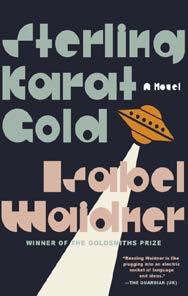
Monica Youn’s From From brilliantly evokes the conflicted consciousness of deracination. If you have no core of “authenticity,” no experience of your so-called homeland, how do you piece together an Asian American identity out of Westerners’ ideas about Asians? Your sense of yourself is part stereotype, part aspiration, part guilt. In this dazzling collection, one sequence deconstructs the sounds and letters of the word “deracinations” to create a sonic landscape of micro- and macroaggressions, assimilation, and self-doubt. A kaleidoscopic personal essay explores the racial positioning of Asian Americans and the epidemic of anti-Asian hate. Several poems titled “Study of Two Figures” anatomize and dissect the Asian other: Midas the striving, nouveau-riche father; Dr. Seuss and the imaginary daughter ChrysanthemumPearl he invented while authoring his anti-Japanese propaganda campaign; Pasiphaë, mother of the minotaur, and Sado, the eighteenth-century Korean prince, both condemned to containers allegorical and actual.
Monica Youn is the author of From From, and three previous poetry collections: Blackacre, a finalist for the National Book Critics Circle Award, Barter, and Ignatz, a finalist for the National Book Award. The daughter of Korean immigrants and a former lawyer, she teaches at Princeton University.


Eliane Brum is an award-winning Brazilian journalist, writer, and documentarist. Her first work of nonfiction to be translated into English, The Collector of Leftover Souls, was long-listed for the National Book Award. She lives in Altamira, in the Amazon. Diamond Stuff, and Gaudy Bauble.
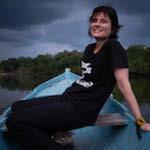
In lyrical, impassioned prose, Eliane Brum recounts her move from São Paulo to Altamira, a city along the Xingu River that has been devastated by the construction of one of the largest dams in the world. In community with the human and morethan-human world of the Amazon, Brum seeks to “reforest” herself while building relationships with forest peoples who carry both the scars and the resistance of the forest in their bodies. Weaving together the lived stories of the region and its history of violent corruption and destruction, Banzeiro Òkòtó is a call for radical change, for the creation of a new kind of human being capable of facing the potential extinction of our species. In it, Brum reveals the direct links between structural inequities rooted in gender, race, class, and even species, and the suffering that capitalism and climate breakdown wreak on those who are least responsible for them.

The characters that populate Yuri Herrera’s surprising new story collection inhabit imagined futures that reveal the strangeness and instability of the present. Drawing on science fiction, noir, and the philosophical parables of Jorge Luis Borges’s Fictions and Italo Calvino’s Cosmicomics, these very short stories are an inspired extension of this significant writer’s work.
In Ten Planets, objects can be sentient and might rebel against the unhappy human family to which they are attached. A detective of sorts finds clues to buried secrets by studying the noses of his clients, which he insists are covert maps. A meager bacterium in a human intestine gains consciousness when a psychotropic drug is ingested. Monsters and aliens abound, but in the fiction of Yuri Herrera, knowing who is the monster and who the alien is a tricky proposition.
In Ten Planets, Herrera’s consistent themes—the mutability of borders, the wounds and legacy of colonial violence, and a deep love of storytelling in all its forms—are explored with evident brilliance and delight.

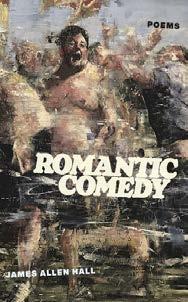
In Romantic Comedy’s opening poem, the speaker announces the book’s genesis: “This story / is mine: there was / a wound, then a world. / It did not mean / me well.” Thus begins a harrowing trek through a life marked by violence and a quest for sensation and connection. There is a retro sheen to these poems, a disco ball fracturing of darkness and light, an AIDS-era aura of intensity fueled by impending extinction. The book is framed by performance, by the language of theater and film, with an array of references to movies which enact the romance of brutality and the brutality of romance, to Cher and Charlie’s Angels, porn and Harlequin romances read “in the laundry room, / my head propped up on a pillow of unwashed / dresses.” The book is romantic as Keats is romantic — it glimmers with negative capability, the “used car salesman who, post-coitus, / cleaned himself with his Megadeath concert Tee,” the “Bad boy who gave me chrysanthemums / and chlamydia,” the private courtyard where “he kisses me / under a magnolia as fragrant as the one in the garden where I hid / as a boy,” “the snow / lowering its gentle hammer on the skulls of lovers.”
James Allen Hall (he/they) lives in Chestertown, MD and is the author of a previous book of poems, Now You’re the Enemy, and I Liked You Better Before I Knew You So Well, a book of lyric essays. They direct the Rose O’Neill Literary House at Washington College. www. jamesallenhall.com

Rob Schlegel lives in the Pacific Northwest and is the author of three previous collections of poetry, including January Machine (Four Way Books, 2014). With the poets Rawaan Alkhatib and Daniel Poppick, he co-edits the Catenary Press.


The characters that populate Yuri Herrera’s surprising new story collection inhabit imagined futures that reveal the strangeness and instability of the present. Drawing on science fiction, noir, and the philosophical parables of Jorge Luis Borges’s Fictions and Italo Calvino’s Cosmicomics, these very short stories are an inspired extension of this significant writer’s work.
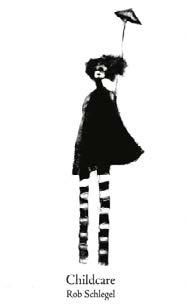
In Ten Planets, objects can be sentient and might rebel against the unhappy human family to which they are attached. A detective of sorts finds clues to buried secrets by studying the noses of his clients, which he insists are covert maps. A meager bacterium in a human intestine gains consciousness when a psychotropic drug is ingested. Monsters and aliens abound, but in the fiction of Yuri Herrera, knowing who is the monster and who the alien is a tricky proposition.
In Ten Planets, Herrera’s consistent themes—the mutability of borders, the wounds and legacy of colonial violence, and a deep love of storytelling in all its forms—are explored with evident brilliance and delight.
Crackling with the hypervigilance of parenthood, Childcare explores the paradox at the root of raising kids: the joy of new life accompanies an awareness of potential loss. Rob Schlegel’s fourth collection observes the tangled emotions of fatherhood; even as he wonders at the strange intelligence of youth, he elegizes the present moment. The longitudinal wisdom of this collection appears in the choreography of its leaps — how it moves from the aside “[My son] needs my love the most when he least deserves it / Is something I read” to the reflection that “Death / Names my shape. I keep my clothes / From dust and ghosts and time. / I’m angry at my father for aging.” From Schlegel’s relentless curiosity and keen observations, the artistic crisis driving the book emerges: does poetry memorialize the ephemeral moment, saving something for us, or does it remove us from experience? The duality of language’s role — that it, ultimately, has the capacity to do both — doubles the significance of “childcare” in this collection, which comes to represent not just the work of child rearing but the dutiful care by adult children for their parents.

The capstone of a quarter-century career in poetry, To the Boy Who Was Night collects the poetry published by Rigoberto González since 1999, including selections from five previous books as well as new work. Mirroring González’s personal trajectory, the arc of this work articulates the course of a life: these poems recall leaving a beloved homeland, confront masculinity and sexuality in new adulthood, imagine the earth devoid of human inhabitants, descend into the realm of ghosts, and return to arrive at Dispatches from the Broken World. This latest section ventures into foreign terrain — an autobiographical confrontation with isolation and the aging body. His lyrical exploration, like the weather reports scrawled on ancient temple walls, will preserve this age-old message: “likely a poem, surely an epitaph.” To the Boy Who Was Night bears the fruit of 25 years of poetry, González’s boldest and most comprehensive volume yet.
Rigoberto González lives in Newark, NJ and is the author of eighteen books of poetry and prose, including previous Four Way Books publications The Book of Ruin (2019), Unpeopled Eden (2013), and Black Blossoms (2011). His awards include Lannan, Guggenheim, NEA, NYFA, and USA Rolón fellowships, the PEN/ Voelcker Award, the American Book Award from the Before Columbus Foundation, the Lenore Marshall Prize from the Academy of American Poets, and the Shelley Memorial Prize from the Poetry Society of America.
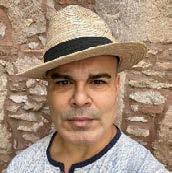
Eugenia Leigh is a Korean American poet living in New York and the author of one previous collection of poetry, Blood, Sparrows and Sparrows (Four Way Books, 2014), winner of the Debulitzer Prize in Poetry. Her poems and essays have appeared in numerous publications including Guernica, The Massachusetts Review, The Nation, Ploughshares, Poetry, and The Rumpus.

The characters that populate Yuri Herrera’s surprising new story collection inhabit imagined futures that reveal the strangeness and instability of the present. Drawing on science fiction, noir, and the philosophical parables of Jorge Luis Borges’s Fictions and Italo Calvino’s Cosmicomics, these very short stories are an inspired extension of this significant writer’s work.
In Ten Planets, objects can be sentient and might rebel against the unhappy human family to which they are attached. A detective of sorts finds clues to buried secrets by studying the noses of his clients, which he insists are covert maps. A meager bacterium in a human intestine gains consciousness when a psychotropic drug is ingested. Monsters and aliens abound, but in the fiction of Yuri Herrera, knowing who is the monster and who the alien is a tricky proposition.
In Ten Planets, Herrera’s consistent themes—the mutability of borders, the wounds and legacy of colonial violence, and a deep love of storytelling in all its forms—are explored with evident brilliance and delight.


“I thought I forgave you,” Eugenia Leigh tells the specter of her father in Bianca. “Then I took root and became / someone’s mother.” Leigh’s gripping second collection introduces us to a woman managing marriage, motherhood, and mental illness as her childhood abuse resurfaces in the light of “this honeyed life.” Leigh strives to reconcile the disconnect between her past and her present as she confronts the inherited violence mired in the body’s history. As she “choose[s] to be tender to [her] child—a choice / [her] mangled brain makes each day,” memories arise, asking the mother in her to tend, also, to the girl she once was. Thus, we meet her manic alter ego, whose history becomes the gospel of Bianca: “We all called her Bianca. My fever, my havoc, my tilt.” These poems recover and reconsider Leigh’s girlhood and young adulthood with the added context of PTSD and Bipolar Disorder. They document the labyrinth of a woman breaking free from the cycle of abuse, moving from anger to grief, from self-doubt to self-acceptance. Bianca is ultimately the testimony of one woman’s daily recommitment to this life. To living. “I expected to die much younger than I am now,” Leigh writes, in awe of the strangeness of now, of “every quiet and colossal joy.”


What does our nature writing say about us, and more urgently, what would it say without us? Tom Comitta investigates these questions and more in The Nature Book, a “literary supercut” that arranges writing about the natural world from three hundred works of fiction into a provocative re-envisioning of the novel. With fiction’s traditional background of flora and fauna brought to the fore, people and their structures disappear, giving center stage to animals, landforms, and weather patterns—honored in their own right rather than for their ambient role in human drama. The Nature Book challenges the confines of anthropocentrism with sublime artistic vision, traversing mountains, forests, oceans, and space to shift our attention toward the magnificently complex and interconnected world around us.
Tom Comitta is the author of 〇, Airport Novella, and First Thought Worst Thought: Collected Books 2011–2014, a print and digital archive of forty “night novels,” art books, and poetry collections. Comitta’s fiction and essays have appeared in WIRED, Lit Hub, Electric Literature, the Los Angeles Review of Books, the Believer, BOMB, and Best American Experimental Writing 2020. They live in Brooklyn.
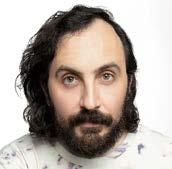
A writer, vocalist and performance/sound artist, LaTasha N. Nevada Diggs is the author of TwERK (Belladonna, 2013). Diggs has presented and performed at California Institute of the Arts, El Museo del Barrio, The Museum of Modern Art, and Walker Art Center and at festivals including: Explore the North Festival, Leeuwarden, Netherlands; Hekayeh Festival, Abu Dhabi; International Poetry Festival of Copenhagen; Ocean Space, Venice and more.
Part poetry collection, part soundscape, Village uses dark humor and keep observation to explore the roots of memory, grief, and estrangement.


The characters that populate Yuri Herrera’s surprising new story collection inhabit imagined futures that reveal the strangeness and instability of the present. Drawing on science fiction, noir, and the philosophical parables of Jorge Luis Borges’s Fictions and Italo Calvino’s Cosmicomics, these very short stories are an inspired extension of this significant writer’s work.
In propulsive and formally inventive verse, LaTasha N. Nevada Diggs examines how trauma reshapes lineage, language, and choice, disrupting attempts at reconciliation across generations. Questioning who is deemed worthy of public memorialization, Diggs raises new monuments, tears down classist tropes, offers detailed instructions for her own international funeral celebrations, and makes visible the hidden labors of care and place. From corners in Harlem through North Carolina back roads, Diggs complicates the concept of “survivor,” getting to the truth of living in the dystopia of poverty.
In Ten Planets, objects can be sentient and might rebel against the unhappy human family to which they are attached. A detective of sorts finds clues to buried secrets by studying the noses of his clients, which he insists are covert maps. A meager bacterium in a human intestine gains consciousness when a psychotropic drug is ingested. Monsters and aliens abound, but in the fiction of Yuri Herrera, knowing who is the monster and who the alien is a tricky proposition.
In Ten Planets, Herrera’s consistent themes—the mutability of borders, the wounds and legacy of colonial violence, and a deep love of storytelling in all its forms—are explored with evident brilliance and delight.


On a dark and lovely winter night, Noah Summers sits before a roaring fire, drifting between sleep and recollection, trying to make sense of a lifetime of psychic visions and his family’s tumultuous history on an Indiana farmstead. Decades have passed since Noah first fell in love with Opal, a brilliant but unstable young woman whose penchant for flames separated the couple after just forty-two idyllic days of married life. Despite the challenges they each faced, their love never wavered in the long years that followed, sustained by letters, memories, and the bonds of family.
Indiana, Indiana establishes the world Laird Hunt returned to in National Book Award finalist Zorrie and introduces the character of Zorrie Underwood for the first time. Written in a masterful elegiac style reminiscent of William Faulkner and Marilynne Robinson, Indiana, Indiana is a beautiful and surreal story that illuminates the heart of rural America.
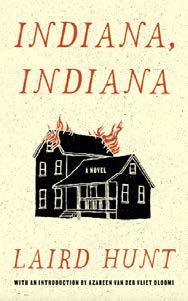
Laird Hunt is the author of Zorrie, which was a 2021 finalist for the National Book Award in Fiction. He has also been a finalist for the PEN/Faulkner Award for Fiction and won the Anisfield-Wolf Award for Fiction, the Grand Prix de Littérature Américaine, and Italy’s Bridge Prize. His reviews and essays have been published in the New York Times, the Washington Post, the Los Angeles Times, and many others. He teaches in the Department of Literary Arts at Brown University and lives in Providence.
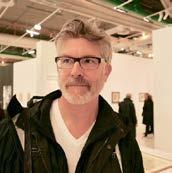
Laird Hunt is the author of Zorrie, which was a 2021 finalist for the National Book Award in Fiction. He has also been a finalist for the PEN/Faulkner Award for Fiction and won the Anisfield-Wolf Award for Fiction, the Grand Prix de Littérature Américaine, and Italy’s Bridge Prize. His reviews and essays have been published in the New York Times, the Washington Post, the Los Angeles Times, and many others. He teaches in the Department of Literary Arts at Brown University and lives in Providence.

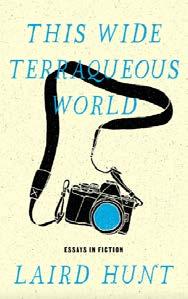
Haunting essays from acclaimed authro Laird Hunt balance intimate remembrance with an examination of the writing life.
The characters that populate Yuri Herrera’s surprising new story collection inhabit imagined futures that reveal the strangeness and instability of the present. Drawing on science fiction, noir, and the philosophical parables of Jorge Luis Borges’s Fictions and Italo Calvino’s Cosmicomics, these very short stories are an inspired extension of this significant writer’s work.
In this new collection of nonfiction from the celebrated author of Zorrie, Laird Hunt uses fiction as an inspiration, a tool, even an obsession, employing its methods to get to the heart of experience. The “sizzling” work of Jane Bowles colors his wanderings through Palermo, while a London museum trip provokes a consideration of taxidermy’s storytelling potential and fairytales blend with echoes of W. G. Sebald, Willa Cather, and László Krasznahorkai. From intrigue at the United Nations to a broken-down car in Kansas, from the history of denim to the dangerous games of childhood, This Wide Terraqueous World leads readers down the winding paths of memory as Hunt examines his subjects in razorsharp prose both eerily spare and richly evocative.
In Ten Planets, objects can be sentient and might rebel against the unhappy human family to which they are attached. A detective of sorts finds clues to buried secrets by studying the noses of his clients, which he insists are covert maps. A meager bacterium in a human intestine gains consciousness when a psychotropic drug is ingested. Monsters and aliens abound, but in the fiction of Yuri Herrera, knowing who is the monster and who the alien is a tricky proposition.
In Ten Planets, Herrera’s consistent themes—the mutability of borders, the wounds and legacy of colonial violence, and a deep love of storytelling in all its forms—are explored with evident brilliance and delight.


Aguilar Zéleny’s English-language debut shows the complexities of survival and joy, love and violence for three women: a teenager abandoned by her guardian at the dump, a scientist doing research on the residents of the dump, and a transwoman living nearby who is the matriarch of a group of sex workers.
Each one of the characters navigates family, abandonment, power, jealousy, greed, and multiple taboos around sexuality and gender violence. Their stories are linked by geography and by ideas of waste and abandonment.
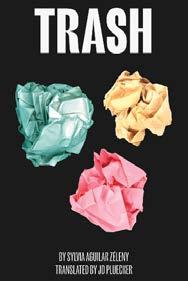
As Aguilar Zéleny explores these territories in her book, she asks crucial questions: who is seen as disposable and why? How do women find their own means of survival and joy in the midst of a perilous sociopolitical context? What does it mean to live a life in a time of austerity and extreme violence? Trash is a critical intervention in Mexican literature.
Sylvia Aguilar Zéleny received her MFA in Creative Writing from The University of Texas at El Paso. She is the author of four short-story books and a young adult novel series. Her novel Todo Eso Es Yo won the National Book Award in Tamaulipas, México in 2015.

Jen Levitt is the author of The Off-Season (Four Way Books, 2016). Her poems have appeared in The Adroit Journal, Boston Review, Tin House, The Yale Review and elsewhere. She lives in New York City and teaches high school students.


The characters that populate Yuri Herrera’s surprising new story collection inhabit imagined futures that reveal the strangeness and instability of the present. Drawing on science fiction, noir, and the philosophical parables of Jorge Luis Borges’s Fictions and Italo Calvino’s Cosmicomics, these very short stories are an inspired extension of this significant writer’s work.
In Ten Planets, objects can be sentient and might rebel against the unhappy human family to which they are attached. A detective of sorts finds clues to buried secrets by studying the noses of his clients, which he insists are covert maps. A meager bacterium in a human intestine gains consciousness when a psychotropic drug is ingested. Monsters and aliens abound, but in the fiction of Yuri Herrera, knowing who is the monster and who the alien is a tricky proposition.
Anticipating and then grieving the death of her father, Jen Levitt’s So Long fleshes out a full elegiac register, sitting with the mourning of farewell while holding onto gratitude, remembrance, and a permeating love. “Soon,” she says, “we’ll have to find another way to meet, as moonlight / makes the river glow.” In the contrails of bittersweet loss, Levitt’s speaker observes all that surrounds her, and the self, too, as a phenomenon in loneliness. In the suburbs, she notes high- school athletes circling “in their sweat-resistant fabrics,” “so natural in their tank tops, those dutiful kids trying to beat time”; upstate, she finds herself in temple where Broadway music has replaced prayer and discovers “no promises, / but, like hearing a rustle in deep woods & turning to locate its source, the chance for something rare.” It is this humanistic faith that inverts the title’s idiomatic goodbye into a statement of permanence, the truth of our enduring, improbable lives: look at this, she seems to command herself, “& look at how lucky I’ve been, for so long.”
In Ten Planets, Herrera’s consistent themes—the mutability of borders, the wounds and legacy of colonial violence, and a deep love of storytelling in all its forms—are explored with evident brilliance and delight.


While Hoffman’s debut collection interrogated the mythos built around grief, inhabiting an Alaska of the mind, her stunning sophomore collection When There Was Light looks at the past for what it was. These poems map out a topography where global movements of diaspora and war live alongside personal reckonings: a house’s foreclosure, parents’ divorce, the indelible night spent drunk with a best friend “[lying] down inside a chronic row of corn.” Here, her father’s voice “is the stray dog barking / at the snow, believing the little strawberries grow wilder / against a field.” In these pages, she points to Russia and Poland and Germany, saying, “It was / another time. My people / another time. The synagogues burn decades / of new snow.” The brilliance of this collection illuminates the relationship between memory and language; “another time” means different, back then, gone and lost to us, and it means over and over, always, again. With this linguistic dexterity and lyrical tenderness, Hoffman’s work bridges private and public histories, reminding us of the years cloaked in shadows and the years when there was light.
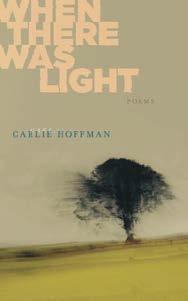
Carlie Hoffman lives in Brooklyn and is the author of one previous collection of poetry, This Alaska (Four Way Books, 2021), winner of the NCPA Gold Award in poetry and a finalist for the Foreword Indies Book of the Year Award. A poet and translator, her honors include a “Discovery” / Boston Review prize and a Poet’s & Writers Amy Award. Carlie is the founder and editor-in-chief of Small Orange Journal.

Rushi Vyas was born in Toledo, Ohio. He is co-author of the chapbook Between Us, Not Half a Saint (GASHER Press, 2021) with Rajiv Mohabir, and his poem “Morning Chant: Scatter” was republished as a broadside by the Center for Book Arts. He earned his MFA from the University of Colorado-Boulder and his BS from the University of Michigan. His poems have been published in Adroit Journal, The Georgia Review, Indiana Review, Landfall (NZ), The Offing, The Spinoff (NZ), Tin House, and elsewhere.


The characters that populate Yuri Herrera’s surprising new story collection inhabit imagined futures that reveal the strangeness and instability of the present. Drawing on science fiction, noir, and the philosophical parables of Jorge Luis Borges’s Fictions and Italo Calvino’s Cosmicomics, these very short stories are an inspired extension of this significant writer’s work.
In Ten Planets, objects can be sentient and might rebel against the unhappy human family to which they are attached. A detective of sorts finds clues to buried secrets by studying the noses of his clients, which he insists are covert maps. A meager bacterium in a human intestine gains consciousness when a psychotropic drug is ingested. Monsters and aliens abound, but in the fiction of Yuri Herrera, knowing who is the monster and who the alien is a tricky proposition.
In this electrifying debut, lyric works to untangle slippery personal and political histories in the wake of a parent’s suicide. “When my father finally / died,” Vyas writes, “we […] burned, / like an effigy, the voiceless body.” Grief returns us to elemental silence, where “the wind is a muted vowel in the brush of pine / branches” across American landscapes. These poems extend formal experimentation, caesurae, and enjambment to reach into the emptiness and fractures that remain. This language listens as much as it sings, asking: can we recover from the muting effects of British colonialism, American imperialism, patriarchy, and caste hierarchies? Which cultural legacies do we release in order to heal? Which do we keep alive, and which keep us alive? A monument to yesterday and a missive to tomorrow, When I Reach for Your Pulse reminds us of both the burden and the promise of inheritance. “[T]he wail outlasts / the dream,” but time falls like water and so “the stream survives its source.”
In Ten Planets, Herrera’s consistent themes—the mutability of borders, the wounds and legacy of colonial violence, and a deep love of storytelling in all its forms—are explored with evident brilliance and delight.

BOOKSTAGRAM
Each issue we feature a new bookstagrammer highlighting some of their amazing work.

NAME: NADIA FAVORITE WINTER READ: A COURT OF FROST AND STARLIGHT FAVORITE GENRE: FANTASY AND CONTEMPORARY ROMANCE.

@confessionsofnadia
TELL US A LITTLE ABOUT YOU.
@confessionsofnadia: My name is Nádia, I'm 25 years old (I'm a '97 Leo baby), and I love to annotate and doodling on my books!
TELL US A LITTLE ABOUT YOUR BOOKSTAGRAM ACCOUNT AND HOW IT GOT STARTED.
@ confessionsofnadia : During the pandemic lots of people felt the urge to connect to something. I was one of those people, and I found my safe place in books. Since the face-to-face communication was pretty much gone for awhile, I decided to create my little corner on instagram and talk about the books I read there. The community of bookworms I found on bookstagram was out of this world, and I'm so thankful for all of them!
WHO IS YOUR FAVORITE INDIE OR SMALL PRESS AUTHOR AND WHY?
@ confessionsofnadia : Last year, I received a message from an indie author asking if I was interested in reading her book. That author is Suelita Constance. As soon as I read the synopsis of her book - Ten Past Two - and saw its cover I was immediately hooked. You can see how much work and love she put into it and I truly value that!
WHO IS ONE OF YOUR FAVORITE CHARACTERS AND WHY?
@ confessionsofnadia : I remember reading The Hunger Games for the first time, when I was 14, and feeling a deep connection with Katniss Everdeen. Many readers find her to be an unlikeable character but I just think she's a strong-minded teenager, who went through a lot and still managed to be caring, loyal and fight for the ones she loved.
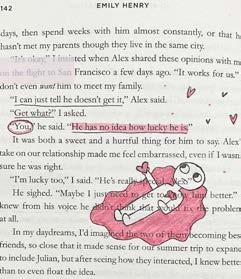




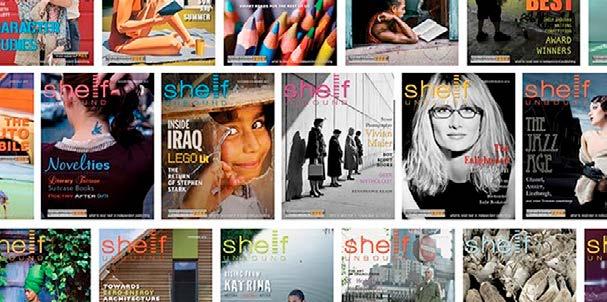

Take
Blake’s hazel eyes scanned the area for a cab. Exiting his small front yard, he made a right turn on the red-brick sidewalk and marched up East Capitol Street toward the United States Capitol.

The chaotic, bustling DC streets contrasted with the quietude of Blakes’s home. Stepping outside, he felt like someone had thrown a pail of ice water in his face. Emergency vehicles whined in the distance. Type-A personalities jogged through the streets. Cars honked, dogs barked, commuter and tour buses bellowed, and early rising workaholics teeming with ambition bantered on cell phones.
Blake was six blocks from the United States Supreme Court building. He predicted that the area would be fertile ground for hailing a cab, but he was wrong. Not a cab in sight. Reality began knocking like a pesky neighbor. He was coming to accept that he’d be late, and the dreaded consequences started to sink in. He needed to brief Mize
before the court hearing. That’s when he reached Fifth Street and broke into a puckish grin. To his surprise, four houses down the block two black Suburbans with police lights mounted on top were idling at the attorney general’s residence. His boss was still home, and the meeting with Mize wouldn’t start without him. There was still hope. But Blake had limited options.
Attorney General William S. Kershing’s motorized escort never stayed in one place long. The normal practice was “capture and release,” as his FBI protective detail called it, then they were gone. The attorney general would be leaving his house soon. Blake pressed forward, his brisk walk turning into a slow jog with the heavy mound of coins jingling in his pockets and the morning’s Sports page tucked in the back of his suit pants. But then, before reaching the curb, Blake heard familiar voices that stopped him cold. He backtracked a few steps and reset his gaze on Attorney General Kershing’s
house.
The attorney general was coming out.
He saw three men of equal stature, all wearing dark suits, walking from the house with his boss in the middle. The agent to Kershing’s right stopped at the front passenger door of one of the Suburbans before turning around to survey the area. The agent to his left waited for Kershing to lunge into the back seat, shielding the attorney general from any would-be assassin. In an instant, both agents climbed in the truck, and before the doors were closed, the tandem of black Suburbans was off—sirens roaring, lights flashing. The agents
had “captured” Kershing and were driving him to the Justice Department. They had executed the procedure with such precision that, for a moment, Blake forgot about his quest for a taxi. Then he saw one coming. The mustardcolored, late-model taxi had stopped and waited for Kershing’s entourage to drive off, and Blake could see that the driver was in no hurry. Blake raced toward the taxi, paying little mind to traffic before darting across the street. He leaped in the taxi’s pathway to catch the driver’s attention, causing him to jam on the brakes and swerve onto the curb. “What in the world do you think—”
“I’m sorry,” Blake said, grabbing the newspaper from the small of his back and plopping down in the backseat, “but I need to get to the Justice Department in record speed. Ninth and Pennsylvania.
Do you think we can beat those two Suburbans?”
“I don’t need to be playin’ no games here,” the driver said, mashing the accelerator to the floorboard and speeding past East Capitol, his coffee-stained white T-shirt barely covering his beer belly. “I ain’t gonna risk losin’ my license because you got up late for work or nuthin’ like that.”
Before Blake could plead his case, his head slammed against the backseat. To avoid whiplash, he clutched the grab handle with his right hand. With his left, he covered his nose to mitigate the putrid odor of vanilla air freshener mixed with mildew. The driver ran a series of red lights and decelerated to make a sharp left turn, manipulating the steering wheel with only the lower half of his palm. As the cabbie continued to complain over the honking horns of
diverted taxpayers, Blake held on for dear life, knowing that this would be his fastest trip to work.
“I mean, you whippersnappers just think you can hop in a man’s car and start tellin’ people to break the laws and such . . . that just ain’t right . . . and I ain’t gonna put up with it. I’m a grown man!”
After his taxi zoomed past the Capitol, and with the driver still grumbling objections, Blake looked to his left. Through the naked limbs of Japanese cherry trees, he spotted Kershing and company traveling in the same direction on a parallel street two-hundred yards away. They weren’t stopping for traffic.
Scavenger Hunt is a gripping and realistic suspense novel chronicling the plight of Blake Hudson, a Justice Department lawyer assigned to a clandestine counterterrorist group created to bypass onerous legal requirements. After the group mysteriously disbands, Hudson becomes the scapegoat and is transformed from hunter to hunted. As he searches for answers and attempts to piece the puzzle together, people are following him, trying to kill him.

 BY BRITTANY BUTLER
BY BRITTANY BUTLER
Bathed in sweat, with their M4 rifles aimed, Juliet Arroway and her teammate emerged from the shadows and made their way toward Abu Hassan’s compound. It was well past midnight, but the late July air in Damascus was thick with heat, laced with the smell of rusted copper.
A destroyed couch, a ruined sink, and other bits of rubble littered the front lawn of al-Alfatih chief Abu Hassan’s safe house, where he planned and directed all terrorist activities. A Syndicate reconnaissance drone groaned overhead, surveying the operation from high above, and a silvery moon illuminated the night sky, negating
the need for nighttime goggles. With a tightness in her throat, Juliet sidestepped a box of dust-covered clothes that spilled out onto the gritty driveway.
She met the eyes of her teammate, Mariam al-Saud, who seemed to be sharp with the same adrenaline Juliet felt crackling through her own veins. As a former Army ranger turned Syndicate spy, charged with hunting energy terrorists, Juliet was used to the spike in blood pres-sure, the sense of danger that made her pulse visible in her throat. But tonight felt different—off, somehow—as though she could sense that
things had already gone horribly wrong.
We are not the first ones here, Juliet’s eyes said to Mariam. After nearly two years of working together as part of the Syndicate—a conglomerate of allied intelligence agencies charged with hunting energy terrorists—both women had learned to communicate through deliberate looks and minimal gestures. With
a wary glance, Mariam nodded her agreement and inclined her head toward an abandoned house across from Abu Hassan’s safe house. If they caught Abu Hassan and learned the identity of the al-Alfatih operatives before they deployed, they could stop the next terrorist attack.
But they hadn’t.
Juliet’s stomach tightened at the possibility of another attack on a country’s alternative energy site, or a bombing at the next Climate Summit as she and Mariam shuffled across
the dust-packed street. The search for al-Alfatih’s chief was like a hunt for a ghost; an empty apart-ment in Riyadh, a shelled-out base in Irbil.
Juliet thought of her source meetings in Amman, rethinking every step since. Source code name HALFFOOTE had provided two phone numbers for Abu Hassan’s deputy, Tariq. But after the Syndicate intercepted Tariq’s phone calls and conducted voice analysis, the Syndicate concluded that the phones belonged to Abu Hassan himself.
“Sacrifices must be made; battles will be lost. It is always this way in a quest for change.”
Women have been on the frontlines in combatting terrorism for decades, yet their stories are seldom heard. Written by a former CIA targeting officer, The Syndicate Spy tells the story of a daring female spy named Juliet who partners with a powerful Arab woman to end a global energy war. But when peace means the crushing defeat of those closest to her, Juliet must rise above, or the result of her choices could have apocalyptic consequences.
And after geospatial analysts looked at Abu Hassan’s call activity, those phones had led them directly to Abu Hassan’s safe house in Damascus. If they could catch Abu Hassan, they could learn the identity of the al-Alfatih operatives during debriefings before the next terrorist attack.

 BY JOHN YEARWOOD
BY JOHN YEARWOOD
On Friday morning, Sheriff’s Deputy Jack Lewis squeaked his beatup Ford LTD patrol car into Darryl Stewart’s driveway and got out to look at the pond. Several blue-teal ducks were paddling happily around, diving and bobbing up, on their annual migration from the Yucatán back to the defrosted tundra of northern Canada. Huh, he thought, you don’t usually see ducks in a pothole. Two males and a female. Story of my life. He stood there for several minutes, watching the game birds and wondering about putting decoys in the pothole in late August when the season opened up, maybe putting up a blind in Darryl’s front yard.
Nah, he decided, the city probably doesn’t want people firing off weapons inside the city limits. He decided he would check, though, just to make sure. If he could bag some ducks
right here out of Darryl’s front yard, it would save a world of trouble.
Because of the pothole, or rather pond, Darryl had stopped parking his pickup on the street. He had it nestled into the chain link fence at the end of his driveway, almost in the backyard where his pair of beagles were setting up a din to welcome Deputy Lewis to the property. And moments later, Darryl came out of the side door, his jeans fastened but barefoot, with two cups of coffee in his hand.
“You’re here early,” he said to Lewis, handing him a cup of coffee. “Well, yeah,” said Lewis. “Just covering the bases. Have you heard from or seen Trey?”
“Trey Green?”
“Yeah, Trey Green. Police chief of Whitmire. Not too tall, not too bright, kind of pudgy, about fifty years old, capable of being a real mean son of a bitch. That Trey.”
“The one with the wart
on his nose like a size-ten boot?”
“No, the other one. The one with the double chin and size forty-eight khakis, wears his belt about twelve inches below his navel. Got short arms.”
“Oh, that one.”
“Yeah. Police chief.”
“Name rings a bell.”
“He told people you were his best friend.”
“If I didn’t feel sorry for him before, I do now.”
“I’m just repeating what I heard,” said the deputy, raising his cup.
“No offense.”
“Oh,” said Darryl, as though he suddenly
remembered. “Oh, you mean that Trey Green. Why sure. Why didn’t you say so?”
“You seen him?”
“No. Why?”
“He ain’t been heard from since Tuesday is all. He radioed the office over here from the police station in Piney Creek, said he couldn’t get home because of the floods. Nobody believed him, except his wife, which was good enough. But he hasn’t been heard from since. Thought maybe you’d heard something.”
“No, I ain’t heard from Trey all week. Kinda strange, actually. I think he’s got a thing for Mary, the way he keeps stopping by.”
“This here is one of her mugs, I’m guessing.”
“How can you tell?”
“Lumpy, misshapen, off
center, garish glaze, lopsided handle, uneven lip. Just little things like that tend to give it away.”
“You are one observant investigator, Deputy Jack Lewis.”
“Thanks,” said Lewis, pouring the rest of the coffee out on the ground. “Sorry,” he said, handing Darryl the mug, “but I ain’t no fan of that chicory shit you put in your coffee. Where’d you pick up that nasty habit?”
“I worked offshore out of Terrebonne Parish when I got back from ’Nam,” Darryl said. “My first couple whores taught me to like it. Never went back to plain black.”
“They must have been hot hot hot,” said Lewis.
“They were. And by the way, I’d appreciate it if you didn’t pour my coffee out on the
lawn. It kills the grass. Just pour it on the concrete instead and let it kill the black mold.”
“Oh, right. Sorry. Wasn’t thinking.”
“Works better than bleach,” Darryl said.
“So, everybody is wondering where Trey is,” Lewis continued. “Last heard from on Tuesday. Today is Friday, and no word. He could be up to anything, of course.”
“Sure could,” Darryl said. “But the better tittie bars are closer to Houst on, on US 59, down south of Humble. The other way from Piney Creek.”
“I’ll write that down in case I need to know,” Lewis said.
The young editor of a weekly East Texas newspaper uncovers clues that lead to the conviction of a mass murderer. The crucial evidence? A jar of pennies stolen by the murderer from one of his victims. As police close in on the murderer, he claims more victims until the editor, supported by several citizens, chases him down and captures him. The book uses this true crime to recreate a sense of ordinary life in a lumbering town in east Texas, where the tensions between wealth and poverty, Black and White, and ignorant and educated stretch the fabric of society to the ripping point.

 BY MARY BETH O’CONNOR
BY MARY BETH O’CONNOR
Spinning around, I beamed at Matt as he let us in, my mouth watering as we sashayed to the glass kitchen table. Bubba set aside ten vials filled with speed for clients to pick up throughout the day. He poured a mound of the glistening white crystals from a sandwich-sized baggie and waggled his finger at us.
“We gotta make this last all day, minus the tastes I’ll offer my customers.”
From a folded denim sack, Bubba removed a razor blade and silver straw. He chopped the meth rat-a-tattat, like a sous chef dicing vegetables during the dinner rush. He carved out three long lines. As the crank provider, he snorted first. The speed disappeared in an instant. Bubba thrust himself up and knocked the chair to the floor. “Man, oh man, oh man. My skull’s about to explode.”
He exhaled four times in staccato, then waved me over. As the woman and his
occasional sex partner, I had second dibs on the drugs. After pecking him on the cheek, I sidled into position. I rolled the metal cylinder between my fingers, then bent down, pressing a finger against my right nostril to increase the suction of the left. I moved the straw along the line as I attempted to ingest the crank. “God damn it. Nothing.”
Months of heavy drug use had clogged my nose. Despite several efforts, I couldn’t inhale the speed. Matt scraped my line into a pouch he made of tissue. I swallowed, then gagged when the damp paper clung to the inside of my throat. Panic threatened to engulf me as I choked. Bubba jumped to his feet and nabbed a Bud. After several swigs, I gargled to propel the crank toward my stomach.
Matt already had snared the silver straw. I fixated on him as he vacuumed up his portion. “Fuck. That’s good shit.”
Bubba nodded with pride, grabbed a deck of cards from the hutch, and began to shuffle. Matt skittered around the apartment, rearranged magazines, and scrubbed a Teflon pot with steel wool. Clutching my half-empty pack of Salems, I shifted to the olive-green recliner and waited for the slower impact from ingesting the drug. Leaning back, I propelled the footrest forward. Thirty seconds later, I slung my legs over the chair’s side. My Dr. Scholl’s sandals flapped as I jiggled my feet.
Renoir’s Luncheon of the Boating Party hung above
the buffet. My mother had purchased a larger version of the same print at Quaker Bridge Mall because it was pretty and matched our furniture. A flash of fury overwhelmed me as I recalled my stepfather backhanding me across the face because I hadn’t dusted it to his satisfaction. As my second cigarette burned down to the nub, my cheeks began to glow, and a familiar heat traveled from my chest to my fingertips. I tilted my neck and expelled a slow “aah.” Bubba whirled around. “There’s my girl.” I stretched my arms to the ceiling, then shimmied my shoulders. Bouncing over to the pressboard stereo cabinet, I flipped through all two dozen albums, then selected Pink Floyd’s Dark Side of the Moon. The boys joined me
in the living room to wait for round two. For the next thirty minutes, we debated my drug consumption options. Matt lobbed the nasal spray to me, I tried to draw in the liquid but to no avail.
“Why don’t you stir it in your soda?”
“Tried that. Nasty taste.” “Well, sweetie,” Bubba said, “I think we need to pop your cherry. You’re gonna have to shoot up.”
An ecstatic tingle pulsed through my body as I anticipated a new high. To prevent Bubba from witnessing my ear-to-ear grin, which might worry him enough to change his mind, I gathered the paraphernalia. Matt snagged a pristine hypodermic, a set of works, from his wife’s dresser. Eyeballing my share, Bubba grasped the razor blade
and swept crank from the pile into a tablespoon. Having watched others, I knew how to prepare the shot. Removing the orange cap from the set took more force than expected. I gasped when I heard the resounding snap of success. I drew up a small amount of water and slowly squirted it onto the meth. With the flat end of the plunger, I crushed the particles until they dissolved into liquid. To avoid losing even one drop, I scraped the residue on the spoon’s inner rim and watched it flow toward the mixture.
From a junkie addicted to methamphetamines to a federal judge, Mary Beth O’Connor’s memoir shares her inspiring journey from rock bottom to resilience as she forged a personal path to recovery from trauma and addiction. Searing, unsettling, and ultimately triumphant, Judge O’Connor’s debut memoir takes readers on a wild ride through the rock-bottom underbelly of intravenous drug addiction to the hallowed halls of justice where she rose to the pinnacle of success as a federal judge. With wit and unabashed honesty, O’Connor shares her remarkable three-phase journey: the abuse and trauma that drove her to teenage drug use, the chaos that ensued from her addiction; and how she developed a personalized secular recovery plan that led to twenty-nine years of sobriety.

 BY DAVID PRUITT
BY DAVID PRUITT
WHY A SEEMINGLY MERCILESS God decided it was his fate to be born into a damaged home is a fair question to ask, though not one with an easy answer. He could’ve been born into the historic mansions of Old Irving Park, with their rolling hills and emerald putting greens, or the fresh-moneyed estates of New Irving Park, with their impeccable redbricked homes backed by placid, clear waters and fronted by wrought iron gates. These are the places of privilege in Greensboro, North Carolina, in 1979. It could’ve happened that way—but it didn’t. That the fates have been unkind to him is beyond dispute. That he’s been hurt by people he loved and trusted is fact. That he, without early expectation or intent, has lied, stolen, and disappointed those who loved him is an
unfortunate truth. And now he’s here in this pivotal moment, these most uncertain of times, on a warm Sunday evening, alone, in a large local park with a small name: Country Park. He hikes the lengthy trails in tepid silence and, despite his troubles, can’t help but notice the beauty of his surroundings. The white oak and sugar maple leaves that dance beneath the clouds. The dogwoods in bloom, stray berries resting above shallow roots. Twin lakes nestled amid verdant woods casting a long shadow that cools the paired-off lovers as they lie in repose, gazing at one another, on their rumpled blankets along the grassy shorelines. With tired feet and a weary glance, he finds an empty park bench overlooking a lake. Taking a seat, he drops his backpack on the thin pine straw at his feet, looks
out, and spots a young boy fishing—his willowy line hanging from a thin bamboo pole with a halfred, half- white sinker floating aimlessly atop the tranquil pond. He stares at its slow, hypnotic drift and remembers a time not so long ago when he eagerly cast his line in these waters. There were fish he caught—and some that got away.
Brown-haired, sunburnt, and long-limbed, at twenty years of age he stands taller than most and is lean and sinewy in a manner that prompts
notice from the occasional passerby. His hands are strong and capable, lending him to excel at challenging, physical work. He may not design the building, but he can align the studs and straight- cut the twoby-fours. And despite his occasional struggle with the truth, at his core, he’s a decent soul and possesses a discrete but present charisma. There’s real good in him and some can see it. But somehow, in the recesses of his anxious mind, any faith about what he can accomplish in this life has long been stripped away.
In the lonely quiet, he ponders the last few difficult months while the darkness continues its rapid descent. He was ordered to leave his
home and not come back— and not without reason. He made mistakes and did things that were just plain wrong. It’s also true that he was raised by a man who survived hard things as a youth and zealously passed them on—as if he was supposed to, as if it was all he knew, as if it was the right thing, as if it was the only way. Maybe it was. And maybe his leaving was for the best.
He spots a bathroom some fifty yards to his right near the dense woodline. With his backpack and its frayed straps resting heavily on his tired shoulders, he walks over and steps through its open door.
It’s quite dark inside. Finding no light switch, he carefully relieves himself in
Relative Distance is a powerful and masculine memoir of resilience and faith. While it’s an unflinching look at brothers being raised by a violent, abusive father and a detached, mentally ill mother, it’s also an inspiring account of two distinctive life journeys and an examination of the role played by family and society in individual homelessness. This deeply moving memoir examines the lifelong challenges that often come for those raised in an abusive home, along with the limitless possibilities we open ourselves to when we allow faith and determination to overcome judgment and fear.
the low-set urinal and throws cold water in his face before stepping back outside. The park is now empty. He checks his watch. It’s 9:58 p.m., and other than a few streetlights on the main park road, it’s dark out— time to bed down. He takes a seat at the picnic table under the attached shelter to take inventory of his few possessions. He has a small blanket, a pair of jeans, a UNC baseball cap, a gray hoodie, assorted underwear and socks, three T-shirts, a toothbrush and toothpaste, a comb, and a Milky Way bar.

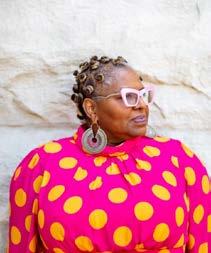 BY ALYSE MGRDICHIAN CRYSTAL WILKINSON
BY ALYSE MGRDICHIAN CRYSTAL WILKINSON
Poetry is a powerful catalyst for lots of things, especially empathy and a deeper understanding of self. It is, in my opinion, the most vulnerable art form – writing poetry means baring your soul on paper for strangers, which takes a lot of courage and self-love. And if not self-love, then selfacceptance. With that in mind, I was very grateful and humbled to receive a review copy of Perfect Black, a debut poetry collection from Crystal Wilkinson (published on August 3, 2021 by The University Press of Kentucky). It is a beautiful and tragic collection, filled with heartbreak and hope, which made me very interested in interviewing Crystal and learning more about her experience writing it. Below you can find the book’s synopsis, along with our conversation.
Crystal Wilkinson combines a deep love for her rural roots with a passion for language and storytelling in this compelling collection of poetry and prose about girlhood, racism, and political awakening, imbued with vivid imagery of growing up in Southern Appalachia. In Perfect Black, the acclaimed writer muses on such topics as motherhood, the politics of her Black body, lost fathers, mental illness, sexual abuse, and religion. It is a captivating conversation about life, love, loss, and pain, interwoven with striking illustrations by her long-time partner, Ronald W. Davis.

CW: My journey as a writer began before I knew that I was on the path. As a quiet girl, I was drawn to books— reading and writing were the only things that motivated me. After college, I began working in public relations with a journalism degree but knew my passion was writing stories. About twenty years ago I decided to go back to get an advanced degree in creative writing at Spalding University. I did this for two reasons. Firstly, so that I could teach college courses and slowly move away from my public relations career. And secondly, because even though my first short story collection was published and I had a contract for my second, I wanted to be immersed in craft. I had also already been teaching creative writing courses at a local writing center, as well as some college level courses, but I wanted to teach full time.
CW: One thing is, I’ve always written and loved poetry, probably even more than prose, so there was this sort of protection of my poetry and not wanting to reveal it as much to people—a kind of coveting of the small wonders of poetry, more so than prose. I think part of what we all do as writers is stand before the world naked in some way, and there is a certain vulnerability. But when you are a fiction writer you can put the bones and meat down and there’s a thread of truth, and it’s kind of fun because no one knows how deep or wide the thread of truth is. You can do that in poetry, but when I write poems I think that those vulnerabilities are on the surface more. Even if there is clearly a speaker of the poem who is not me, the truth is always right at the surface, instead of buried deep down the way I’m inclined to write fiction. So that awareness of vulnerability was much different for me in this book than my other books because it is not as hidden. Before I would sprinkle a bit
of myself or familial truth into my character, but it just stands there in a poem, like these stalks of truth. I also play with a range of form—two-line stanzas, longer poems, the lyric, the formal. Writing the poems were one process and compiling them into the book was another. As some poems and lyrics fell by the wayside and I began to look at them as a collective, and start thinking about them thematically, then it became even more frightening in some ways because I said, ‘Whoa, there’s a big truth there. Oh my God, here this is.’ When I’m writing fiction, I always think of these storylines sort of like clotheslines, like this is a through line, now what scenes are going to hang on this? Like if there is a through line of a mother-daughter relationship, what scenes am I then going to put in the novel that I’ve already written, or that I need to write, that will solidify that storyline, or the mental illness thread, or whatever themes there are in the book. In some ways the same thing happened with this. I hadn’t really planned on writing a memoir in verse, but a lot of the poems that were heavily threaded with topics that were more away from me or in styles that were more away from my truth began to thin
out.
A good poet friend, Rebecca Gayle Howell, looked at the poems for another project and said, “I think you have a collection” and I said, “No, no, that’s not what I do.” So, we began to look at it together, at some of the sections and what they were doing. In some ways it is almost like a contrapuntal. And I mean that in the loosest of ways. If we look at it as a memoir in verse, the first section is coming of age, the second an awakening, third, sort of grown woman poems, so it can be read that way. But also, you can look at the grandmother poems by themselves, or the grandfather poems, or look at the poems that look at women’s bodies that tie in about sexual abuse. There’s a variety of ways to look at them. Thematically the poems can be examined, can be read backwards and forwards. Even the illustrations can stand alone and be in conversation with the reader, but they are also doing something else in the call and response they play with the narratives in the book.
ARTWORK FOR POETRY CAN BE DIFFICULT — WHAT WAS COMMUNICATING AND WORKSHOPPING LIKE FOR THE BOTH OF YOU, ESPECIALLY CONSIDERING THAT HE’S YOUR ROMANTIC PARTNER?
CW: “Ron and I have always wanted to write a book together. In some ways, this book is the child that we never had. We are independent thriving artists on our own. He has his third book coming out this year with Wayne State University Press, but it was so much fun to do this projec together. It’s something we’ve always wanted to do. The process of making these decisions of what art should be in conversation with which poem was an interesting and elevating process. I think it did something for us both artistically. We are able to look at each other’s work differently and step deeper into each other’s psychological landscapes. Just when we thought we knew everything about one another as artists, as a couple, then there was another layer to discover in this process. It was fun—tension arose and dissipated, rose and dissipated, until we got it done. I think we are both better off artistically for that shared process.
I SEE THAT YOUR MAIN FIELDS OF INTEREST ARE POETRY, FOOD WRITING, AND SHORT STORIES. DO YOU SEE A CONNECTION BETWEEN THESE DIFFERENT ART FORMS? AND WHAT DIFFERENT AREAS OF YOURSELF ARE YOU ABLE TO EXPRESS THROUGH THEM?
CW: Of course they are all connected. One of the things I’ve learned about myself as a writer in recent years is that the poet doesn’t live in one house, the fiction writer in another, the essayist and food writer in yet another. I live in a hybrid space as a writer. My stories are poetic. My novels have meter. Recipes are poems. Essays are lyric. I’m no longer looking at those leaps as negative. It’s such a wonderful thing to have a notion of craft but to also be able to return to my highest creative self. It’s been such a relief and such a joy to not see myself as a broken writer or to see that longing to fracture the narrative as a negative thing.
SPEAKING OF, COULD YOU TELL ME ABOUT YOUR FICTION?
WHAT THEMES DO YOU USUALLY EXPLORE THROUGH YOUR STORIES?
CW: My fiction is a way to explore
issues in the world, primarily the worlds of women and the people who love them. Part of my process is to begin with a character who I've patiently waited to blossom in my head to become a full blown living breathing person. Then curiosity takes over and I find out everything I can about that character, their families, coworkers, towns, their lives. What's always surprising to me as a fiction writer is that, even though the plan might be to write a life so different from my own, it always circles back in funny, often surprising ways. I explore Black women in Appalachia and other places and circumstances too, but Black people in a rural landscape captures me and doesn't let go. I explore themes of gender, coming of age, sexism, racism, mental health, and sexual abuse, among many other things. The characters and their lives always guide what the theme becomes.
COULD YOU TELL ME A BIT ABOUT PRAISE SONG FOR THE KITCHEN GHOSTS, YOUR UPCOMING BOOK? WHAT HAS THE PROCESS OF WRITING AND PUBLISHING BEEN LIKE FOR YOU?
CW: This will be my fifth book, a
culinary memoir. Again, I feel such a sense of relief to be able to explore a variety of genres but to still be able to write a book about my matriarchal ancestors going back to 1795 using archival research, history, poetry, fiction and the lyric essay form all in the same book. I’m really excited about the experimentation that my editor allowed me to do with this book and I hope that readers will respond to it.
WHAT ADVICE WOULD YOU GIVE TO YOUR YOUNGER CREATIVE SELF? WHAT DO YOU WISH YOU’D KNOWN GOING INTO THIS FIELD, AND WHAT’S ONE THING YOU’D LIKE TO TELL NEWER WRITERS?
CW: Imitation is a form of flattery but I wish I'd known sooner that I could invent ways of being, ways of doing. I spent so many years looking for a model for The Birds of Opulence (my novel) not realizing that it was okay to forge a different path no matter how unusual it may be. That's what I'd say to a young writer. Flex. Learn the rules, the craft, but also stretch and strut your own art the way you see fit.
CRYSTAL WILKINSON a recent fellowship recipient of the Academy of American Poets, is Kentucky’s Poet Laureate. She is the awardwinning author of Perfect Black, a collection of poems, and three works of fiction—The Birds of Opulence , Water Street and Blackberries, Blackberries. She is the recipient of a 2022 NAACP Image Award for Outstanding Poetry, a 2021 O. Henry Prize, a 2020 USA Artists Fellowship, and a 2016 Ernest J. Gaines Prize for Literary Excellence. She has received recognition from the Yaddo Foundation, Hedgebrook, The Vermont Studio Center for the Arts, The Hermitage Foundation and others. Her short stories, poems and essays have appeared in numerous journals and anthologies including most recently in The Atlantic, The Kenyon Review, STORY, Agni Literary Journal, Emergence, Oxford American and Southern Cultures. Praise Song for the Kitchen Ghosts, a culinary memoir, is forthcoming from Clarkson Potter/Penguin Random House. She currently teaches at the University of Kentucky where she is Professor of English in the MFA in Creative Writing Program.
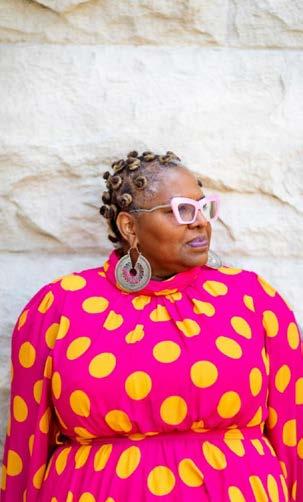


Shelf Media Group's digital young adult community designed to connect readers with YA authors and books.

Released on July 5, Lynn Slaughter’s Deadly Setup is her newest young adult thriller. It’s also a dark, coming-of-age story with a bit of hope.

Seventeen-year-old Samantha, or Sam, isn’t happy when she finds out her mom becomes engaged to a man whose last wife died under mysterious circumstances. When her mom’s fiancé is murdered, Sam is accused of doing it. Now she has to prove her innocence, and she gets help from her boyfriend’s dad, who is an ex-police officer.

Deadly Setup got my attention right from the beginning and never let up throughout the novel. Lynn does a great job of keeping the suspense going. I don’t think I’ve read a thriller or suspense novel like this in quite a while. The story kept me guessing as to who the murderer was. As I read, questions kept popping up in my head--Was Sam really the one who killed her mom’s fiancé? I didn’t think so, and I thought that from the very beginning. But if not her, then who did? I had a couple of guesses, and I kept turning the pages until the end.
Lynn tells Sam’s story through a first person point of view, at times, I even felt like I was right there either in Sam’s shoes or right next to her seeing what she was doing and hearing her words. Lynn also did a good job conveying Sam’s thoughts and feelings. I almost felt like the story was more real than it is.
Young adult fiction continues to become one of the most popular genres – mostly for adults. Join us each issue to find your next YA read.
The daughter of a New England heiress, seventeen-year-old Sam has tried hard to fulfill her father's dying wish: "Take care of your mother for me." Not an easy job. When her impulsive, romance-writing mom announces her engagement to a man whose last heiress wife died under suspicious circumstances, Sam tries to dissuade her mother. But her mom is convinced she'll finally have the "Happily Ever After" she writes about. And then Sam's life implodes. Her mom's fiancé turns up dead, and a mountain of circumstantial evidence points to Sam as the killer. On trial for murder, she fights to prove her innocence with the help of her boyfriend's dad, an ex-homicide cop.
Just when things are looking especially bleak, Sam uncovers evidence she never expected to find. She faces a tough decision: At what point does the price of loyalty become too high?

Reviewers”
- URBAN EPICS, BLOGGER AWARDS“Top 100 Book Review Blogs For Book Readers and Authors”
“The awesome Girl+Book YA book review blog.....I smiled to see Blue Karma recommended for "tom-boys, tree climbers, adventure seekers, and backyard-campers" because I have answered (or still do) to all of these descriptions....The Girl+Book blog continues to make my day.”
- J.K. ULLRICH,AUTHOR
OF BLUE KARMA“I Just Read Girl Plus Book’s Review Of Revelation, And It Made My Night!”
- ELLERY KANE, AUTHOR OF LEGACY SERIES
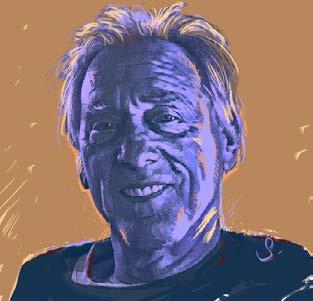
The epilogue to Paul W. Williams’ memoir, Harvard, Hollywood, Hitmen, and Holymen, contains eight lists of “important practical things” he’s learned in his over seven decades on this planet. Those lessons stem from experiences that read as sometimes wild, sometimes winsome, sometimes woeful, but all of them, as the reader finds out, are memorable to Paul. Actor Elliott Gould wrote of the book, “It's funny. It's sad. It's exciting. It's sexy. And it's frightening— sometimes startlingly so—but it's authentic and true with a great cast of characters, all real people.” The book will be published February 14, 2023 by The University Press of Kentucky.
YOUR EXPERIENCES ARE ABUNDANT, AND AT ONE POINT YOU SAY THAT YOU “MADE A LIST OF ALL THE EXTRAORDINARY EVENTS YOU COULD.” DID ONE IN PARTICULAR MAKE YOU THINK ABOUT WRITING A BOOK? WHAT MADE YOU FINALLY DECIDE TO WRITE AND PURSUE PUBLISHING?
PW: No, no, once I survived thirty years—a big surprise—I planned to write a memoir if I lived long enough. To empty my head of pictures and emotions
as part of achieving a clarity before I died. So writing the first list of extraordinary events was just the beginning of the longplanned process. It was obvious to me that part of the preparation for dying was a letting go of the past, forgiving all, accepting the life cycle.
PW: Not one. If you pursue selfunderstanding, doors appear at the conclusion of each learning chapter throughout your life. The trick is not to be afraid to go through the next door. And the next, again and again. But to answer your question concretely, some of the most transformative: discovering the transcendental nature of masturbatory orgasm in the seventh grade and discovering a dozen years later that having unlimited wealth is not what it is cracked up to be. Certainly, encountering Mescalito and the vision teaching of Dilgo Khyentse Rinpoche (the Dalai Lama’s principal teacher) were great expansions of consciousness.
DID YOU EVER CONTEMPLATE
FICTIONALIZING YOUR STORY? WHAT DO YOU THINK MEMOIR CAN DO FOR THIS STORY THAT FICTION CANNOT?
PW: One, no. Two, nothing. I think the power of this memoir comes from the rigorous objective truth of the reporting. It is hard to believe it is not fiction! Perhaps that is why I see “jaw-dropping” so often in reviews.
THE BOOK COVERS A LOT OF GROUND. WHAT MADE YOU DECIDE TO GO FOR BREADTH INSTEAD OF FOCUSING ON ONE SPECIFIC TIME OR EVENT? DID ANYTHING SURPRISE YOU AS YOU MADE YOUR WAY THROUGH THE MEMORIES OF THESE EXPERIENCES? DID ANYTHING NOT MAKE IT INTO THE BOOK?
PW: The great psychoanalytic historian, Erik H. Erikson, was my tutor at Harvard College and mightily impressed me with his re-imagination of studying the entire life cycle from childhood to impending death. Almost every night, the prior day’s writing sparked early morning detailed remembrances. I eventually learned to get up at three or four a.m.and write them down!
The existing text is about 280 pages—I had to cut another 280 pages of wonderful stories that did not directly contribute to my evolution. For example, I wrote about discussing not going to Vietnam with Oliver Stone, and I report his buddy’s night scope shooting Viet Cong on the riverbank, but I cut [this portion]: “Oliver tells me that when his company attacks a peasant village, they charge from the perimeter toward the hooches, shooting constantly, with hard erections and spontaneous ejaculations.” It followed the vignette of my father dying, so the death was relevant, not the sex.
Those vignettes and other writings are being published later this year in a separate book, Emissions, Omissions & Illustrations, A Paul Williams Anthology, edited by Paul Cronin.
I’M CURIOUS ABOUT YOUR IDEAL READER. DOES YOUR BOOK HAVE ONE? WHO IS THE TARGET AUDIENCE?
PW: Someone interested in the late 1960s and 1970s New Hollywood and who wants to go deep inside those times—deeper than Rock Me On the Water, for example. And a reader who is interested in how to reduce the influence
of capitalism and ego in their life and how to embrace a transcendental point of view. I suppose the target audience is film students, teachers and scholars, progressive literary types, people interested in spirit, and seniors in their sunset years.
READERS WILL RECOGNIZE A LOT OF FAMOUS NAMES IN THIS BOOK. WHY DO YOU THINK YOU CROSSED PATHS WITH THEM? DID THESE FOLKS INFLUENCE YOU ANY MORE OR LESS THAN THE PEOPLE READERS WON’T RECOGNIZE? DO YOU STILL FEEL LIKE “AN UNKNOWN IN THE BIG LEAGUES” AT TIMES?
PW: I wanted to understand first-hand how the world worked more than anything else. So I was always on a peasant’s private quest for wisemen and understanding. It led me to many teachers and lovers. If someone is included in this book, they were among my influencers, high and low. And now the “big leagues” have gotten as big as nature, Spinoza’s god.
SPEAKING OF NAMES, YOU TALK ABOUT CHANGING YOUR LAST NAME FROM GOLDBERG TO WILLIAMS TO HIDE YOUR
JEWISH IDENTITY, THEN FEELING “NOT A BONA FIDE MEMBER OF THE CHRISTIAN WORLD OR OF THE JEWISH WORLD . . . AN OUTSIDER TO THE OUTSIDERS.” DID YOU EVER CONTEMPLATE CHANGING IT BACK TO GOLDBERG? IN HINDSIGHT, DO YOU AGREE WITH YOUR DAD’S DECISION TO CHANGE IT? HAVE YOU MANAGED TO DEVELOP THE POSITIVE IDENTITY THAT
ERIK H. ERIKSON SPOKE OF?
PW: I contemplated it once or twice, but thought I was too deeply into my new persona. My friend Charlie Plotkin advised me eight years ago to “deal with the Goldberg thing.” That helped me to start writing this book. No. I would not do that to a seventeen-year-old in the midst of forming his identity. In the book I write, “My father did not know this fact or understand that his renaming of his son was a major wound. A disabled adolescent now goes undercover and tries to live his dream. Some scars never heal. Here I am, to slay someone else’s ghosts: all of his near misses, all of his disappointments, all of his years of want.”
I have made interesting progress [toward the positive identity] with the help of
shrinks and actors and gurus, not to mention being on the wrong side of a gun.
CERTAIN INSTANCES STOOD OUT TO ME, LIKE WHEN YOU WENT IN TO TALK ABOUT YOUR THESIS. DESPITE NOT KNOWING THE BACKGROUND LITERATURE AND MISUNDERSTANDING THE QUESTION, YOU STILL RECEIVED A “LOW-PASS.” IT'S LIKE THE UNIVERSE SMILED ON PAUL W. WILLIAMS. IN A WAY, I FELT LIKE THAT IDEA REPEATED ITSELF OVER THE COURSE OF THE BOOK: SURE, YOU HAD OBSTACLES TO OVERCOME, BUT IN THE END, YOU WERE ALSO LUCKY. WOULD YOU AGREE?
PW: Yes. I flew out of my mother’s car when I was three and landed thirty feet away in a snowbank. I followed the arrows on the trail to the top of the mesa when I was six years old and did not fall straight down to my death. My hot girlfriend turned out to be a major league heiress. When we married, they offered to buy me a California movie studio that was up for sale. And on and on and so it went, and that is another reason for writing the book, to accept it all.
ACTOR. DIRECTOR. PRODUCER. WRITER. ALL OF THOSE (AND MORE) DESCRIBE YOU. DO THOSE CREATIVE PURSUITS ALL FILL DIFFERENT VOIDS FOR YOU? WHERE DO YOU THINK YOUR STRENGTH LIES? WHERE DO YOU THINK THE PUBLIC WOULD SAY YOUR STRENGTH LIES?
PW: I was a poor boy, trying to make my way in life but with a deep impulse toward essential truth. I was just an opportunist trying to find a path that made sense. My strength lies in my willingness to be weak. This book is really an attempt to deal with diminishing my notion of my lower self. It is a quest to find higher fulfillment than materialism while honestly enjoying each moment as much as possible, as Jean Renoir advised me when I was twentyone. The public? My sense of humor and attention to detail.
WHAT’S THE MAIN MESSAGE YOU HOPE YOUR READERS TAKE AWAY FROM YOUR MEMOIR?
PW: Have a good time before you die (or maybe leave your body).

The movie director Paul Williams is a real-life Forrest Gump. Williams' experiences form a unique and often wild constellation of encounters with star power, political power, and spiritual power―a life cycle that led to fame and fortune and to integrity and anonymity.
In a mad childhood created by an autocratic English teacher father and an infantilizing mother, he develops a precocious visual acuity to avoid wallops and a writing ability that mollified his father. This skill set wins him a scholarship to Harvard, where he needs to learn how the Wisemen think. He seeks out tutors who reveal themselves: Kissinger, Skinner, Galbraith, Erikson, Alpert, Leary, the Hubleys and Jean Renoir. Howard Gardner is his roommate and Michael Crichton is an editor friend on the college daily, The Crimson. After months, his lover reveals she is the heiress of a great American fortune.
 BY MELISSA SCHOLES YOUNG
BY MELISSA SCHOLES YOUNG
The Fehler sisters wanted to be more than bug girls but growing up in a fourth- generation family pest control business in rural Missouri, their path was fixed. The family talked about Fehler Family Exterminating at every meal, even when their mom said to separate the business from the family, an impossible task. They tried to escape work with trips to their trailer camp on the Mississippi River, but the sisters did more fighting than fishing. If only there was a son to lead rural Missouri insect control and guide the way through a crumbling patriarchy.
Available at Amazon and Barnes & Noble.
A sequel to the awardwinning novel Arnold Falls, Hot Air features the characters of the small, upstate New York town during the summer following the events of book one. The "incredibly funny" (Kirkus) antics continue as Arnold Falls has several identity crises all at once. Our narrator, Jeebie, has a life-changing moment with a cow, there's trouble brewing at the hospital, and Arnold Falls may change its name to Emollimax, for a payout. This is a character comedy about life in a small, extremely quirky town, for fans of Armistead Maupin and P. G. Wodehouse.

 BY ALLISON HONG MERRILL
BY ALLISON HONG MERRILL
Allison Hong isn’t a typical fifteen-year-old Taiwanese girl. Unwilling to bend to the conditioning of her Chinese culture, which demands that women submit to men’s will, she disobeys her father’s demand to stay in their faith tradition, Buddhism, and instead joins the Church of Jesus Christ of Latter-day Saints. Six years later, she drops out of college to serve a mission—a decision for which her father disowns her.
Available at Amazon and Barnes & Noble.
 BY SHARON WINTERS
BY SHARON WINTERS
In December 2014, chocolatecolored dogs with golden eyes is found wandering in Arizona‘s Yuma Desert. A kind hearted man brings the lost dog to a rescue facility. Sadly, no one chooses to adopt the stray, who’s desperate wish is for a family to love and cherish him. Soon however, while he is at a second animal rescue, his picture is published in a local newspaper paper and a compassionate couple adopt him, name him Karl, and bring him to his forever home, one filled with unconditional love. Parents and children alike will be captivated by this tender, humorous look at Karl’s now happy life told from his point of view and with pictures of the real Karl, a handsome Boykin spaniel.
 BY ANGUS KENNEDY
BY ANGUS KENNEDY
Australian wine writer, Andrew Johnston, goes to Dubrovnik to prepare an article for his editor on the wines and wineries of southern Rhône. He meets up with an old Bordelaise wine making acquaintance, Lucien Delasalles, and his step-sister, Niki Menčetić. He becomes embroiled in the murky affairs of Niki and her family and the local police, which leads to his sad departure from the ancient city.
www.anguskennedybooks.com
Available at Amazon, Amazon UK, and Barnes & Noble.
 BY ANGUS KENNEDY
BY ANGUS KENNEDY
The book gives a composite picture of what heaven is like based on the eyewitness testimony of nineteen separate accounts. As a result it gives a more complete picture than any other single book does. All of Scripture’s testimony about heaven is confirmed and many more details God never revealed in His Word. Many readers say it’s a great blessing and have bought extra copies to give away.
www.anguskennedybooks.com
Available at Amazon, Amazon UK, and Barnes & Noble.
Australian wine writer, Andrew Johnston, is again staying in Europe, this time with his brother, Adrian, for both work and a holiday. During an extensive new wine project from his publisher, he meets up again with a number of his old acquaintances from both France and Dubrovnik, including Niki Menčetić. Whether he can resolve his difficulties with Niki’s life is uncertain.
www.anguskennedybooks.com
Available at Amazon, Amazon UK, and Barnes & Noble.
 BY ANGUS KENNEDY
BY ANGUS KENNEDY
In this final novel of the Out of Solitude tetralogy, Australian wine writer, Andrew Johnston, is comatose in a hospital in Sydney, Australia after the events of Međjugorje in Bosnia and Herzegovina. His Croatian lover, Niki Menčetić, believes him gone, the victim of a cruel deception by Andrew’s brother, Adrian, and has returned to Dubrovnik. Andrew now has to try to re-establish the rest of his life.

www.anguskennedybooks.com
Available at Amazon, Amazon UK, and Barnes & Noble.
Finnley McDougall’s boring schoolboy life in Seattle gets turned upside down when Great Uncle Hugh gives him a most unusual gift – a scruffy, rude, bad-tempered Scottish rock creature called Wullie who brings danger and disaster with him wherever he goes.From French snobs in fancy hotels, rusting barges on the Seattle waterfront, abandoned coalmines and flooded quarries in the Scottish hillsides filled with bullies, gangsters, slobbering dogs and weird food Finn is drawn into an evil plot that threatens to destroy everything he loves… including Edinburgh Castle.
 BY CHRISTIAN A. BROWN
BY CHRISTIAN A. BROWN
Morigan lives a quiet life as the handmaiden to a fatherly old sorcerer named Thackery. But when she crosses paths with Caenith, a not wholly mortal man, her world changes forever. Their meeting sparks long buried magical powers deep within Morigan. As she attempts to understand her newfound abilities, unbidden visions begin to plague her—visions that show a devastating madness descending on one of the Immortal Kings who rules the land.

www.christianadrianbrown.com
Available at Amazon and Barnes & Noble.
 BY REBECCA MILLER
BY REBECCA MILLER
After her mother's sudden death, artistically gifted Megan lost her will to draw as she watched her family crumble. When her father unexpectedly moves what's left of them halfway across the country to mend, Megan must try, yet again, to rise from the ashes and create a new existence for herself. She's intrigued when she sees Shawn-a secluded classmate who sparks unexpected drawing inspiration. Shawn is protecting a terrible secret and teeters on the edge of letting go. With each layer Megan strips from him, she gets hints about how broken he is.
 BY MICHELLE YOUNG
BY MICHELLE YOUNG
We all have secrets—little white lies we tell ourselves. Everyone has them, but no matter how hard we try to keep them hidden, even our deepest secrets can come up to the surface.
When the Millers move across the province to pursue William’s lifelong dream of becoming a helicopter pilot, Quinn, a new mother, feels isolated from everything she’s ever known, only, Quinn has been there before. Struggling with severe postpartum depression, Quinn turns to her elderly neighbour for help, but how much does she really know about Mrs. Westover? Only what she chooses to reveal. Mrs. Westover never lies, in fact, she despises liars. What will she do when she finds out Quinn’s been dishonest with her?
 BY C.L. OLSEN
BY C.L. OLSEN
Abandoned on a remote mountain in eastern Pennsylvania by his father at age five, and discarded at an orphanage by his mother a few years later, this is the remarkable true story of one boy's impenetrable resilience and courageous hope; holding onto his dreams in the face of heartbreaking loss, loneliness and betrayal.

Little Robbie Olsen, his two brothers, sister, and mother would be saved from starving to death by the kindness of the Mennonite family who farmed the hills far below. Forced to leave their mountaintop home, they would walk fifteen miles into town, carrying what little they had in paper bags, finding lodging in a two-room apartment above Arlene and Ray's Bar.
 BY IAN V. CONREY
BY IAN V. CONREY
A young man signs his own death warrant when he joins an already failing militia. A teenage girl is haunted by her childhood abuse and begins to crave the very things she hates. A childless mother finds herself on the run as a convicted murderer. Yet they are all unaware that their own fates are tied to a young orphan who has drowned and come back to life in a foreign land where he will be the death of everyone he meets. Haelend's Ballad is a grimdark fantasy/ steampunk tale about what happens when men and women from two colliding cultures realize they may not be on the right side. Heroes are villains. The persecuted are oppressors. And when rumors begin to spread that the world is dying, the darkness of their own hearts betrays them.
 BY LISA BRAXTON
BY LISA BRAXTON
The fictional city of Bellport, Massachusetts, is in decline with an urban redevelopment project on the horizon expected to transform this dying factory town into a thriving economic center. This planned transformation has a profound effect on the residents who live in Bellport as their own personal transformations take place.
The Talking Drum explores intra-racial, class, and cross-cultural tensions, along with the meaning of community and belonging.
Available at Amazon and Barnes & Noble.
A Ukrainian rebel. Three generations of women bearing the consequences. A journey that changes everything. When Ivanna opens the door to uniformed officers, her tranquil life is torn to pieces - leaving behind a broken woman who must learn to endure cold, starvation, and the memories of a man who died in the quintessential act of betrayal. Using her thrift, ingenuity, and a bit of luck, she finds a way to survive in Soviet Ukraine, along with her daughter, Yevtsye. But the question remains, will she be strong enough to withstand her daughter's deceit and the eventual downfall of the nation she has devoted her life to?
From shootouts and robberies to riding in cars with pimps and prostitutes, Frederick Reynolds' early manhood experiences in Detroit, Michigan in the 1960s foretold a future on the wrong side of the prison bars. Frederick grew up a creative and sensitive child but found himself lured down the same path as many Black youth in that era. No one would have guessed he would have a future as a cop in one of the most dangerous cities in America in the 1980s---Compton, California.

In the West, there are worse things to fear than bandits and outlaws. Demons. Monsters. Witches. James Crowley's sacred duty as a Black Badge is to hunt them down and send them packing, banish them from the mortal realm for good. He didn't choose this life. No. He didn't choose life at all. Shot dead in a gunfight many years ago, now he's stuck in purgatory, serving the whims of the White Throne to avoid falling to Hell. Not quite undead, though not alive either, the best he can hope for is to work off his penance and fade away.
 BY CHRISTIAN A. BROWN
BY CHRISTIAN A. BROWN
As two queens plot each other's destruction, a small band of adventurers continues its quest for the knowledge needed to defeat the mad King Brutus and his unearthly parasite, the Black Queen. Their search brings Morigan and the Wolf to the perilous forests of Alabion, where they and their companions will face the darkness of their pasts-and discover equally dark destinies.
www.christianadrianbrown.com
Available at Amazon and Barnes & Noble.

Emotional Magnetism is the self-help book for people who want to improve their communication and connection in their relationships.

Have you ever felt unheard or misunderstood? Maybe your partner just doesn't seem to get why some things are important to you. Or perhaps your boss is seemingly oblivious to half the things you've pointed out in the past week. You're not alone.
In this life-changing book, communications expert Sandy Gerber reveals how, by understanding the Four Emotional Magnets that motivate people to listen and act, she transformed her relationships-and how you can do the same.

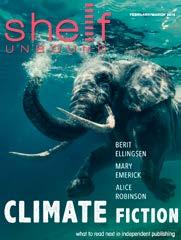
Latest releases, award winners, and more!
“…a tribute to those who fought for freedom.” The Foreign Service Journal Riding the icy, moonlit sky— They took the war to Hitler. Their chances of survival were less than fifty percent.
Their average age was 21. This is the story of just one Lancaster skipper, his crew, and the woman he loved.
Flying Officer Kit Moran has earned his pilot’s wings, but the greatest challenges still lie ahead: crewing up and returning to operations. Things aren’t made easier by the fact that while still a flight engineer, he was posted LMF (Lacking in Moral Fibre) for refusing to fly after a raid on Berlin that killed his best friend and skipper. Nor does it help that he is in love with his dead friend’s fiancé, who is not yet ready to become romantically involved again. ABOUT THE AUTHOR

Helena P. Schrader is an established aviation author and expert on the Second World War. She earned a PhD in History (cum Laude) from the University of Hamburg with a ground-breaking dissertation on a leading member of the German Resistance to Hitler. Her non-fiction publications include Sisters in Arms: The Women Who Flew in WWII, The Blockade Breakers: The Berlin Airlift, and Codename Valkyrie: General Friederich Olbricht and the Plot against Hitler, an English-language adaptation of her dissertation. Helena has published twenty historical novels and won numerous literary awards, including “Best Biography 2017” from Book Excellence Awards and “Best Historical Fiction 2020” from Feathered Quill Book Awards.


Vonny Kwan wakes up in a Nevada hospital, the victim of a hit-and-run accident she doesn’t remember. As she struggles to recover from her injuries, she learns that she also has no memory of the past nine years, including her marriage and what she was even doing in the West.
While she’s still reeling from the shock of her amnesia, two detectives visit and inform her that her husband, John, was recently murdered. As more information comes to light, Vonny grows increasingly suspicious of everyone around her.
Vonny realizes she must piece together the last decade to uncover the truth. The missing chunk of time holds secrets about the person she became, the mysterious man she fell for, and the life she never wanted.
ABOUT THE AUTHOR
Danielle M. Wong is a bicoastal author with a permanent case of wanderlust. An extended trip abroad inspired her debut novel, Swearing Off Stars. The book was published to critical acclaim, garnering an Independent Press Award, a Benjamin Franklin Award, and an International Book Award. Danielle’s writing has appeared in Harper’s Bazaar, HuffPost, PopSugar, and Writer’s Digest. She is currently working on her next novel.

An unconventional, satirical, controversial, time travel comedy!

What if you could reach back in time to deport the world's worst environmental villains to a depository planet before their greed condemns Earth to an ecological apocalypse? What if each time you did so, an alien instantly extracted a body part and replaced it with a refurbished one? Would you still do it?
Heartrending yet hilarious, Doctor Refurb is influenced by actual historical events and confronts the serious subjects of climate change, far-right politics, and child abuse committed by Christian authorities.
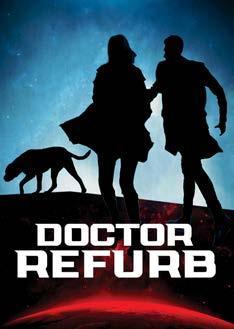
ABOUT THE AUTHOR
Marty Essen began writing professionally in the 1990s, as a features writer for Gig Magazine. His first book, Cool Creatures, Hot Planet: Exploring the Seven Continents, won six national awards, and the Minneapolis Star-Tribune named it a Top Ten Green Book. His second book, Endangered Edens: Exploring the Arctic National Wildlife Refuge, Costa Rica, the Everglades, and Puerto Rico, won four national awards. Marty is also a popular college speaker. He has performed the stageshow version of Cool Creatures, Hot Planet on hundreds of campuses, in forty-five states. Marty's latest books, Time Is Irreverent and Time Is Irreverent 2: Jesus Christ, Not Again! are science-fiction political-comedies.
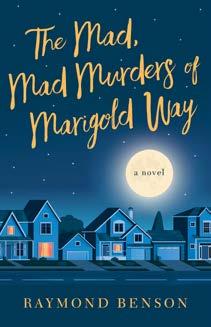
For Scott Hatcher, a former television writer turned struggling novelist with a failing marriage to boot, social-distancing and mask-wearing feel like fitting additions to his already surreal life. When his wife Marie and neighbor John Bergman disappear in the middle of the raging COVID-19 pandemic, Scott is naturally mystified and disturbed, but he is also about to learn that his picturesque neighborhood hides more than just the mundane routines of suburban life. When a fire claims the empty house for sale next door, the entire community is shocked when the charred remains of Marie and John are found inside. Stranger still, stockpiles of valuable PPE clearly stolen, were destroyed in the blaze alongside them. As the neighborhood reels from the loss, Scott and Bergman's earthy and enticing widow, Rachel, not only find themselves under investigation for the crime, but also inexorably drawn to one another. As tensions reach a fever pitch, the tale--which is at once familiar and ordinary, yet bizarre and eerie--shows that, just like life in 2020's uncertain times, dread and danger lurk below the hidden underside of everyday suburbia.
ABOUT THE AUTHOR
Raymond Benson is the author of over forty published books. He is most well-known as the third--and first American-author of continuation James Bond novels, commissioned by the Ian Fleming copyright holders. In total, six original 007 novels, three film novelizations, and three short stories were published worldwide between 1997 and 2002. His bestselling and critically praised five-book serial, The Black Stiletto, is in development as a possible film or TV series. Raymond's other recent acclaimed novels of suspense are Blues in the Dark, In the Hush of the Night, and The Secret on Chicory Lane.

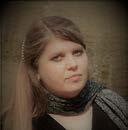

If your stepmother were a sociopath, how would you know? And who would you turn to?
Life is not as ordinary as it seems for Gaynelle and Vivian, who only understand that the woman they now call 'Mama' is complicated and difficult to please. Is the romantic love that Gaynelle finds at a tootender age going to last? And will Vivian uncover the truth about her parentage while recovering from a strange illness?
Rural South Carolina meets the Roaring 20's in this tale of two sisters who face separation and trauma with the resilience of the young and find their way, despite everything.
ABOUT THE AUTHOR
SOPHIA ALEXANDER
Sophia Alexander is the mother of two college-age children and a number of manuscripts. Her character-driven historical fiction grips readers' emotions and surprises them with unexpected twists. A full-time author with a passion for genealogy, she resides near the beautiful Southern city of Savannah, Georgia, but studied in the magnificent Pacific Northwest at Bastyr University, where she earned a doctorate in naturopathic medicine-and thus her characters are often found swallowing decoctions or slathering on herbal salves. Her narratives have appeared in local anthologies, and she was awarded first place in the Savannah Authors 2017 Short Story Contest.
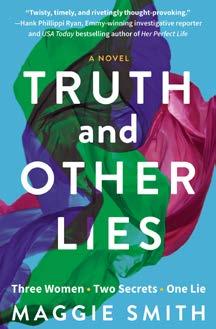
Megan Barnes' life is in free fall. After losing both her job as a reporter and her boyfriend in the same day, she retreats to Chicago and moves in with Helen, her over-protective mother. Before long, the two are clashing over everything from pro-choice to #MeToo, not to mention Helen's run for U.S. Congress, which puts Megan's career on hold until after the election.
Desperate to reboot her life, Megan gets her chance when an altercation at a campus rally brings her face-to-face with Pulitzer Prize-winning journalist Jocelyn Jones, who offers her a job on her PR team. Before long, Megan is pulled into the heady world of fame and glamour her charismatic new mentor represents.
Until an anonymous tweet brings it all crashing down. To salvage Jocelyn's reputation, Megan must locate the online troll and expose the lies. But when the trail leads to blackmail, and circles back to her own mother, Megan realizes if she pulls any harder on this thread, what should have been the scoop of her career could unravel into a tabloid nightmare.
ABOUT THE AUTHOR
Maggie Smith loves a challenge. In a career that’s included work as a journalist, a psychologist, and the founder of a national art consulting company, in 2022 she added published author to her resume with the release of her debut novel, Truth and Other Lies, released by Ten16 Press. She makes her home in Milwaukee, WI with her husband Scott and her aging, but adorable Sheltie.



 BY ALYSE MGRDICHIAN
BY ALYSE MGRDICHIAN
In the world of writing, people tend to assume that picture books and middle grade fiction are easier to execute than adult literature: “They’re shorter! The less words there are, the easier the project will be.” Wrong. Very wrong. If anything, the economy of words presents a new struggle — how do you tell an effective story and make young audiences care within a limited page length? Picture books, for example, are typically 32 pages (with illustrations taking up most of the space), while a middle grade novel tends to be anywhere between 20,000 and 50,000 words.
I could turn this into a whole writing blog, but there’s already so much info out there about the technical stuff: creating titles, drafting strong beginnings, building tension, delivering a satisfying payoff, etc. These things all pull the reader in — but how do you then connect with them and make them stay? How do you keep them invested in the journey of the main character (and doing all of this, mind you, within a page limit)? The answer is simple: real kids connect with relatable characters.
Although the external stakes are compelling, the characters themselves
do most of the legwork. Why?
It’s because of the things they go through, and the responses they have to their circumstances. Humans are complicated, and so are children — they feel complex emotions, although they may not always have the words for it, and they’re learning about the world as they go. In this way, regardless of whether the characters are human or not, they need to feel human and have human problems.
For example, you could tell a story about a dog going to the dog park, eating treats with his owner, and going home … but aside from the inherent love people tend to have for dogs, why should kids care about Sparky’s big day?
Maybe he has never been to the dog park before, and is nervous about whether or not he’ll make new friends
— this mirrors lots of “first day at school” experiences that children have, which builds an emotional connection between the reader and character. For example, I can personally commiserate with Sparky, because I’ve never been the best at making good first impressions or being sociable. But if Sparky can make new friends, maybe I can too!
This brings me to an important point,
though — kids are smarter than you think they are. If you spell out the “moral of the story” for them, you’re insulting their intelligence (and they can tell). So, how do you combat the urge to overshare? Show, don’t tell.
If you’ve heard that advice before, you’re probably rolling your eyes because it is so often said. However, when it comes to connecting with children, it’s especially true. The last thing they want (or need) is another lecture or heavy-handed fable. For example, instead of saying “Sparky made friends because he got out of his comfort zone,” show him doing it through action. Show him nervous, show him awkward, show him ashamed, show him brave. Kids will be able to look at that and see the connection between Sparky’s life and their own, without you having to explicitly tell them. And with more complex emotions, like grief, the answer is not to tell kids how they should feel or how they should respond to their circumstances. Instead, through compelling characters, you can show the consequences of human choices (with varying levels of simplicity, depending on the age range of your readers).
Invisible Dragon (Angie Lucas) and A Monster Calls (Patrick Ness). Both deal with grief, and the forms grief may take … however, Lucas’s story is a picture book, while Ness’s story is for middle grade readers.
Take, for example, My Big Dumb
With My Big Dumb Invisible Dragon, we see the dragon representing the young narrator’s grief, which he is trying desperately to get rid of. It always ruins everything, and makes him feel and do weird things. We feel for the narrator, and cheer as he learns to live peacefully with his dragon. A young reader can comprehend the narrator’s emotions because they are put both simply and concisely — and thinking of their emotions as a dragon could, ultimately, help young children put into words the feelings they cannot name.

On the other hand, the narrator of A Monster Calls is 13. In this story, Ness delves deeper into the specific emotions that grief can bring, such as rage and isolation. When we feel powerless, we want to feel powerful. When we feel invisible, we want to be seen, whatever the cost. And A Monster Calls ultimately teaches the reader that people are complicated beasts, rarely ever just good or bad — and that not every story has a fairy tale ending.

Here we see a bit more articulation than in My Big Dumb Invisible Dragon, because the reader is assumed to be a bit older. And while the narrator’s
mother is already dead in My Big Dumb Invisible Dragon, the main character in A Monster Calls must grapple with the inevitability of his mother’s death, as her chemo treatments begin to prove ineffective.
As we read both of these stories, we feel the characters’ loneliness, confusion, and hope — because we are them, and they are us. Granted, I’m not literally either character, and neither are you. However, we can still put ourselves into the shoes of others … and more often than not, children can too. Why? Because we may come from different backgrounds, but we feel the same things: rage, grief, loneliness, powerlessness, embarrassment, envy, etc.
That’s the power of empathy, of human connection. Whether young or old, we learn by watching others, and children are especially aware of this (and skilled at it, too). When they read about an imperfect (i.e., relatable) character, they’re able to see their own lives and experiences lived out vicariously through the story, learning more about themselves, others, and the world as a result. That’s what ties the soul of your story to the soul of your reader, making them stay for good.


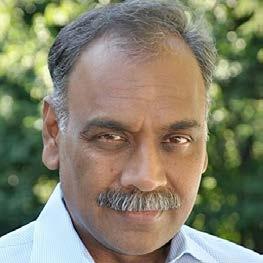 BY MICHELE MATHEWS
BY MICHELE MATHEWS
Anne Yoder released her first novel, The Enhancers, in October 2022. I had the opportunity to interview her about how she juggles her pharmacy job and her writing to make the most of both worlds.
IN ADDITION TO BEING A WRITER, YOU’RE ALSO A PHARMACIST. WHY DID YOU DECIDE TO PURSUE THIS FIELD? HOW DO YOU JUGGLE THE TWO JOBS?
AY: I always wanted to write. I was perhaps more aware than the average child of the practicalities of this, given my parents were both trained in the sciences and didn’t see writing and the arts as a viable career path. I almost fell into pharmacy school if one could —I thought I’d use the degree as a stepping stone to work in public health, mental health, or some related field. In the end, I followed through for reasons both simplistic and mercenary. I’d always excelled in math and chemistry, and I realized that as a pharmacist I could work part-time and have time to write. Until a few years ago, I’d only worked in hospitals and in longterm care, ie, in pharmacies that never closed, and so I worked mostly evenings and weekends. It’s often intense work when on the job, but it’s shift work, so not work I take home with me. This leaves time for writing.
DID YOUR WRITING
BEGIN? SHARE YOUR WRITING PROCESS.
AY: As soon as I began to read. I had such wonder for books and stories as a child. My mother and father, and even extended family, made a point of reading to my brother and me — Curious George, The BFG, Danny Champion of the World, (I adored Roald Dahl’s imagination — his grotesqueries and underlying misanthropy hinted at a reality that didn’t usually line children’s stories), The Chronicles of Narnia. God bless Beverly Cleary and Judy Blume.
Regarding my process, I either have a clear idea of what I intend to write and that I can write rather swiftly, or I have a sense of intrigue — with an idea, a phrase, a situation, a sense that requires excavation and attention paid to discover where it’s leading. The second situation is more common for me, and I write many messy drafts to find my way through.
In writing The Enhancers, I found that creating time for this process consistently, even if nothing is written, is quite generative.
AY: I'm a promiscuous reader who loves
too many books and pieces of writing too intimately to choose favorites. Books, to me, have always existed in a chorus of sorts. I find joy in the cacophony. A library is a wonder precisely because of the multitude of voices and language and ideas contained within. What if I select a favorite piece of writing from my youth that still delights me? “The Owl and the Pussycat,” which I first encountered in the wondrous Random House Book of Poetry for Children.
I just listened in on a full-length reading of Bernadette Mayer’s Midwinter Day on solstice — organized by Leann Brown/Tender Buttons Press. The epic poem takes daily life as its subject and was composed on December 22, 1978. It awed me in its fullness and play and seriousness and timelessness, which are qualities in much of Mayer’s work. It’s a new favorite.
In relation to The Enhancers and its encounter with pharmaceuticals, Paul B. Preciado’s Testo Junkie is vital and bears reading and rereading.
THE ENHANCERS IS ABOUT THREE TEENS NAVIGATING THE PHARMACEUTICAL WORLD. WAS IT YOUR INTENTION TO INCLUDE YOUR OTHER JOB EXPERIENCE AS
AY: Yes. I hadn't found a way that I wanted to integrate my experience as a pharmacist, and working within the healthcare industry, into my creative work until I started The Enhancers. In part because my creative time had been a reprieve from that world. It wasn't until I stopped working as a pharmacist for a few years and was enrolled in art school for my MFA that I was able to approach the experience and specific catalog of knowledge with a sense of possibility and play.
AY: I didn’t realize how literal the words “release” and “launch” would be in relation to the experience of publication as an author. After ten years of writing the novel and ample rejection, I feel lighter and free, and grateful to have some readers on this endeavor.
AY: A reader has so many options of books to read and possible ways to satisfy an appetite for language and narrative that at the very least I hope that reading The Enhancers gives a sense of satisfaction of having completed
the journey — linguistic, narrative, existential — within its pages. My favorite books leave an impression that returns within the days and weeks after reading or that alters my perception in some way. I hope The Enhancers leaves readers changed in a similar way via the encounter.
AY: Sure, although I think many authors read beyond the bounds of the genres they commonly write within. Also, each writer has their own set of strengths and weaknesses. I happen to have an education in the health sciences and parents who have advanced degrees in engineering, metallurgy, and computing, so I have an intimate knowledge of the sciences that many writers do not. Drawing from the sciences within fiction in my case is easily classified as science fiction, but I’ve always been more drawn to psychological narratives, literary fiction, poetry, and language. I studied in the graduate program at the School of the Art Institute of Chicago for an MFA in Writing. One didn’t select a specific genre to write in, and taking classes across the arts disciplines was encouraged. (I studied performance
and art history and TA’ed a class in art and technology.) I’m more interested in possibilities that occur when collapsing boundaries of genre or where they are exceeded, innovated upon, and transformed.
AY: I’m about to leave for a monthlong residency where I will return to a manuscript that I started writing when first submitting The Enhancers. I have a few more ideas in the pipeline — I generally have more ideas in my reservoir than I can take on. This current manuscript is a psychological narrative, written in first person, and is quite intimate. It’s in many ways different than The Enhancers, and this is deliberate. I would love to finish this novel within a year or two, so that I can move on to what I anticipate will be the next book. I’d love for the next books to come more readily than The Enhancers did, not dramatically so, but so that a decade from now it has more company on the shelf.
“Fans of Ling Ma and Jennifer Egan, here is your next book. Anne K. Yoder, in a lyrical voice of the many, gives us a haunting tale of pharmacology and a story of boundaries: human, chemical and industrial. Where are those boundaries again? Where does a body start and end? Or, as Yoder puts it, How much information could one memory hold? In a text that is itself a wild, wonderfully written ride through a wormhole, The Enhancers thrills and horrifies with profound ramifications.”
–Samantha Hunt, author of The Unwritten Book and The Seas
“The Enhancers asks, “How do I distinguish between what’s me and what’s chemical?” Animated by the absurdity of a Yorgos Lanthimos film, The Enhancers is a wildly original and contemporary tale about chemical augmentation, memory, yearning, and loss. Imagine the fearlessness and wild imagination of Jenny Erpenbeck if she had a background in the pharmaceutical industry and you might come close to approximating the tremendous brilliance of Anne Yoder.”
–Patrick Cottrell, author of Sorry to Disrupt the Peace
"The Enhancers experiments with language and ideas the way its characters experiment with chemicals, leaving the reader dizzy with excitement, asking: What is a fact? What is natural (and can it be saved)? Is self-enhancement also selferasure? In a world where every activity is regimented yet ever-changing outside of one's control, Anne Yoder cautions to be careful what you wish for (especially since you're always being watched and tested). My brain feels like a honeycomb full of bees after reading her latest work."
-- Sarah Gerard, author of True Love and Sunshine State
THE ENHANCERS is a polyvocal novel that follows three teenage friends coming of age in a techno-pharmaceutical society. Hannah is born and raised in a town whose industry revolves around Lumena Corp., maker of the supplement Valedictorian. When Hannah and her friends start taking Valedictorian, or V., a mandated mental augmentation, they start to witness its untoward effects--Celia is institutionalized after an accidental drug-induced psychotic break, and not long after Hannah's mental stability begins to slip. When a factory fire halts production, it threatens to throw the entire town into withdrawal. The Enhancers questions who we are when defined by our ability to process information. With mental augmentation as a baseline: how do we know ourselves, and what does it take to break free from this alienation?

ABOUT THE AUTHOR
Anne K. Yoder's fiction, essays, and criticism have appeared in Fence, BOMB, Tin House, NY Tyrant, and MAKE, among other publications. She writes, lives, and occasionally dispenses pharmaceuticals in Chicago.


The struggle of parents to support their children in all circumstances is an experience shared by many. Fort Unicorn and the Duchess of Knothing chronicles this experience and a great deal more through the perspective of the author. The journey Nelson creates for the reader is a profound one, intensely intimate, full of detail and breadth, and touched with emotion on every page.
TEN16 Press, a division of Orange Hat Publishing, housing fiction, non-fiction, YA and poetry books.

It is appropriate to comment on the meaning of the title. Fort Unicorn refers to the dwelling created by its inhabitant: the author’s daughter, Shyloh, the Duchess of Knothing. In reality, this was the small corner of a homeless encampment eked out by Shyloh in San Diego in July of 2019. The wordplay (think knot in terms of crafting knots) and whimsy of both titles are an immediate attestation of the free and playful spirit of Shyloh. However, by the time the narrative reaches this point, Shyloh has long been battling various inner demons and addictions with various drugs.
The readers are brought to this eventual moment with the full stories and context of both Shyloh and her mother, Andrea. The story is framed from Andrea’s perspective, and we learn that she, too, grappled with similar challenges while growing up. Fortunately, she was able to establish a definitive and clean break from such damaging habits and found more wholesome outlets to pursue and immerse herself in. As her life progresses, we observe the development of her professional boxing career, and as a coach and athletic trainer.
Andrea’s life is fully shared from the beginning of her story: its circumstances and locales, its relationships, and her professional development. As readers, we benefit from this intimate look in understanding Andrea’s hopes for Shyloh’s life. We bear witness to a mother’s moments of pain and disappointment, waxing hopes, and occasional raw exasperation from the persistent and repeating cycles that engulf Shyloh. The book is incredibly rich with its variety of the correspondence between mother and daughter, including many photographs, a history of Shyloh’s blog that she kept, letters sent between the two, and pictures of different crafts or art made by Shyloh. This narrative is kept tightly organized with timestamps of each chapter, keeping the reader fully aware of the passage of time, progress
and regressions, and the unfolding of the wider story. It is a narrative that encourages the reader to form their own internal questions and contemplation alongside Andrea’s own monologue and shared thoughts.
In summary, this is an emotionally taxing and candid memoir that surely will speak to all readers. Contained in this well-written and captivating narrative is heartbreak, acceptance, and above all, a beautiful tribute to the great challenges of being a parent for a child that at times is completely unwilling or unable to accept help. Yet, Nelson expounds on the wisdom she was able to obtain and beauty she observed from this journey, and it is a valued experience for readers to join her on.
This memoir is at once spare, raw, heartbreaking and lovely. The stories are unique, yet familiar, for anyone impacted by substance use disorder which, at this point, is all of us. Fort Unicorn is a gift to the world, because it reminds us of the humanity in every person struggling with addiction.”
—Nora Hertel, journalist and the founder of The Optimist, a digital news startup in Minnesota

 BY WYATT BANDT
BY WYATT BANDT
Most people who write want to get published, but the first problem they encounter – beyond actually writing – is figuring out how. There are always the big publishers like Penguin Random House, Harper Collins, and their ilk, but just getting heard by these giants can be a challenge in of itself.
Thankfully, indie and self-publishing is on the rise, and getting published is easier than ever. Plus, you can have more control over your work, how it gets promoted, and you get more money from each sale.
However, knowing where to start is a challenge.
First off, how do you know whether you want to go with an indie press or forge into the unknown with self-publishing.
If you are willing to put forward a little capital, indie publishing has a lot of benefits. Much like working with a Big 5 publishing house, indie publishers have connections. They have an established pipeline to retailers and likely people
that follow their publications. They have editors, graphic designers, and industry experts. These are the things you’re paying for when you sign up with an indie publisher, and it can be very well worth it. Though it may not be up to the same level as Simon & Schuster, it may be good enough for what you want out of your story.
Second, you get to have more input on the final product and how it’s marketed. Big publishers know what works and what doesn’t. I’ve spoken to authors who got published name-brand and they had little agency over their marketing strategy or even what their cover looked like. If you think this is something that you care about, you may choose to go indie.
Plus, they’re often willing to take a chance if they see promise in your work and it aligns with their mission. I remember the day I got an email from the lead editor at Bellevue Literary Review where she said she’d love to publish my essay so long as I tied up the themes a little better. There were several other journals that didn’t like my piece or it wasn’t a good fit for them, but Danielle asked me to work with her, and my piece came out much better for it.
I’m glad she took a chance on me, and thankfully, small publishers can do that. Finally, getting your work to an indie publisher is pretty easy. Many simply have submission portals directly on their website. If you want to fire and forget and see what sticks, it’s a great start. If you need a place to start, look locally. Is there a university press nearby? Is there a press that focuses on the stories written by people in your area? Next, go to a book fair or festival. They’re filled with authors and publishers, and you’ll be able to get first-hand experience with the people that may one day publish your story.
Self-publishing is similar to indie publishing in a lot of ways. You have total control over the final product and you don’t have to jump through as many hoops. You do lose out on the expertise a professional publisher brings, but that may be alright with you.
Self-publishing also tends to be a lot more work.
If you want a copyedit, you’ll need to do it yourself or hire someone to do it. If you want a cover, you’ll need to design it yourself or hire someone to do it. If you
want your book on a certain platform, you need to take care of that as well (at least in most cases). You are your own boss: if you want something to get done, you’ll need to put the effort in.
But because you’re your own boss, you get a large cut of the spoils. Selfpublishing often has a royalty rate between 60-70%, which is significant compared to the 10-20% you’ll get through a publisher – indie or otherwise. Another downside to self-publishing is it lacks prestige. Because anyone can do it, you have no one to vouch for the quality of your work. And that’s understandable; I know if given the option, I’d sooner read a book traditionally published opposed to one self-published simply because I know that someone beyond the author thought it was good.
You’re also trying to stand out in a crowd when you self-publish. Again, because anyone can do it, a lot of people do it. So just because you’re published, unless you do something spectacular to make yourself seen – whether that’s marketing or a stellar story – you may not sell like you want to.
But that doesn’t mean it isn’t worth
it. Amazon reported that 40% more authors self-published through Kindle Direct Publishing earned $50,000 or more in royalties between March 2020 and March 2022. If you do your homework and people like your writing, you can start earning a decent chunk of passive income.
Though finding an indie publisher requires a more nuanced approach, selfpublishing has several clear contenders that you should look into, especially if you’re okay with selling e-books.
First is Amazon’s previously mentioned Kindle Direct Publishing. It’s free, your books populate to their site within 72 hours, and you get 70% royalties. Another good place to start is Apple Books and Google Play. Like KDP, they also have free publishing and 70% royalties.
There are nuances between these publishers, but with a little research, you can figure out which is your favorite. But then again, when aggregators exist, you may not have to choose.
book out on a lot of platforms easily. By working with an e-book aggregator, they do all the work and get your book on all of their associated platforms for you. Many will also format your manuscript for you. However, aggregators don’t do it for free: many have upfront or yearly fees, or they take a cut from the sale.
For example, Draft2Digital publishes to 13 retailers, including Amazon, Barnes & Noble and Apple Books. It also has an option for your books to be print to order. In total, it costs you 10% of each sale you make.
Just like knowing what your readers want, how you get published depends on knowing what you want. It’s a balancing act between how much you want to spend up front, how big of a cut you want, among many other factors.
Whether you find an indie publisher that shares your vision or you carve your own path through self-publishing, you need to take that first step.
If you don’t give up, it won’t be long until you’re published.
Aggregators provide a way to get your
Shelf Media Group's digital magazine about podcasts and podcasters.


A warm, welcoming chat about books.

The Quick Book Reviews Podcast is a weekly podcast which includes author interviews, book reviews, opinions and conversation.


READ THE INTERVIEW ON THE NEXT PAGE.
Podster is a column for podcast listeners and serves as a curator for the best of known and unknown podcasts.
 BONNETS AT DAWN BY LAUREEN AND HANNAH
BONNETS AT DAWN BY LAUREEN AND HANNAH
PH: I (Philippa) have loved books for as long as I can remember, from sitting under my duvet with a torch as a child, reading books past my bedtime, to getting my first weekend job in the local library. In a world where we've witnessed such volatility and uncertainty, books are the constant escape and have transported me to different worlds.
PH: It started three years ago, when I had already established a platform on Instagram using post-it notes to give my reviews on books. It was suggested that I take it further, so I literally held a vote between YouTube or Podcasts, with podcasts winning the vote. I also preferred producing a podcast because I don't have to wear make-up and get dressed up. Also, I felt that the book community was already very well developed on YouTube, however that wasn't the case with podcasts. What I wanted to do was replicate the cosy, chatty feel you get on YouTube and
put that out as a podcast.
PH: A warm, welcoming chat about books.
I usually have one longer author interview plus one shorter interview, as well as five books reviews on each episode. Plus there is some chat from me. I just want people to love reading, to be able to escape into a book, to feel better from listening to me, and perhaps a smile or a laugh and a growing list of books to read.
PH: I love reading books and recording the podcast, but the editing and marketing takes time. I get some amazing authors, and I always finish talking to them feeling brighter and better. Authors are my rockstars and the fact that they want to come on and talk to me is incredible.
HOW DID YOU GET THE WORD OUT ABOUT YOUR PODCAST IN THE BEGINNING, AND HOW HAVE YOU GROWN YOUR AUDIENCE?
PH: I started an account on Twitter and that has helped, plus the Instagram and TikTok accounts work too. However, it is mainly word of mouth, as people tell their friends and more and more start listening. The amount of listeners I get now is amazing; it's wonderful! I feel honoured that so many people around the world enjoy listening to me.
WHAT’S ONE OF YOUR FAVORITE EPISODES?
PH: I enjoy every episode, however the one where I had Stephen Fry come on and talk about his book has to be the standout. He was such a kind man and an absolute pleasure to talk to.
WHAT IS YOUR UPLOADING SCHEDULE, AND WHAT CAN WE EXPECT FROM THE WORST BESTSELLERS IN THE UPCOMING MONTHS?
PH: Every Monday (with a 2 week break in July & December) there is a new episode waiting for you, with a wide range of books and authors to choose from. There are some wonderful author interviews coming up and books to review. I cant wait for everyone to listen in!
WHERE CAN LISTENERS FIND QUICK BOOK REVIEWS?
PH: The "Quick Book Reviews Podcast" is available on all good podcast sites.
Find us on Social....
TWITTER: @QuickBookRevie2
INSTAGRAM: @quick_book_reviews
TIKTOK: @quickbookreviews

CAAB Publishing Ltd is a traditional, small, indie company helping unknown authors have a voice and inspiring new writers to take that first step into the world of publishing. WWW.CAABPUBLISHING.CO.UK

So, you’ve finally written your book. After weeks, months or even years of writing, it’s finally finished. You have printed copies and you’re ready to share your hard work with readers. Congratulations!
You crave that moment of glory when you see your book on a bookshop shelf.
But how do you get your indie novel onto the shelves of a high-street bookshop?
Question one is usually. Will the bookshop stock it? Well, there is only one way to find out, drop them a line. Booksellers like to be emailed. It gives them time to think about your proposal; it gives them time to chat to colleagues, and it gives the opportunity to deal with the request within their normal day.
If you do decide to show them the book in person, please don’t visit unannounced. It’s beneficial instead to email ahead so they can arrange a quick appointment for you with the appropriate buyer at a time that works with the shop diary.
What Booksellers need to know to help them make a decision - you should include the following information in your proposal:
• A quick synopsis of the book – just two or three sentences.
• A couple of lines about who you are.
• Include a professional invoice outlining your terms of business.
• The sales details - How much your book retails for.
• How much you are selling it to bookshops for. Nielsen reports that the average discount bookshops receive is just over 40% off the recommended retail price.
•The format (Paperback/ Hardback). It is always recommended that the book has a spine; that the title and author is printed on the spine; and that there is a 13 digit EAN barcode (based on the ISBN) printed on the book.
• Returns’ information. The most usual trade practice for
independently published titles would be for the books to be supplied on ‘sale or return’ where the bookshop pays for the stock according to the payment terms of your invoice, but has the right to return unsold stock for a full refund.
• Think about payment terms and the length of time the bookshop should have the stock for sale. If after this agreed length of time the book has not sold it is your responsibility to collect unsold stock. If the book is not collected after 3 months, the bookseller can dispose of the stock.
• A few sample pages for the seller to read.
• A jpg image of the cover.
• Who the competitor - or comparable authors - are in your eyes?
• In which section you would suggest the seller display the book. What is the genre, the age range, etc.
• If the book has any local ties, is it set in the local area? Did you go to school nearby? Does it mention local people or places?
• Do you have any local publicity lined up? (i.e. features, adverts, interviews in local newspapers/ radio) This can have a real impact on improving local sales.
Tips –
• Have printed copies of your book that are not Print on demand copies. Have them professionally printed.

The Wishing Well Collection by Liana Wall is a series of books written for younger children. They are adorable anthologies and each story has a sweet message for the reader. They show children how to be brave, accepting or kind. The stories focus on a family of fairies and their adventures in their enchanted land full of wonderful creatures and magical fun.
• Be competitive regarding the pricing of your book.
• Look at the production quality; a well presented finished product speaks volumes. Look at books in similar genres to your own on bookshop shelves and note the current design styles/finishes/fonts being used.
• Give a lot of thought to the jacket design. Review the competition. If you want your book to take up space on a shelf face out the jacket must be of excellent design and quality.
• Pick your time of year carefully. The majority of new writers are launched in the beginning of the year. If you release too close to Christmas your book may get lost on the shelves. If you come in February or March, often there is space to display your book, giving it a better chance of selling.
• Think about how you might promote your book and direct people to the bookshop for sales.
• Outline your marketing & publicity plan for the book.
There are plenty of wonderful small indie bookshops that will delight in taking a few books from a local author, they may offer signing dates, or meet the author events. The best thing you can do is build up a relationship with these lovely shop owners and let them see you are dedicated to your book, and getting it into readers hands. The more you do, the more you sell.
DL: Desperate Literature is an independent international bookshop since 2015 in the heart of Madrid. We try to build a community through literature - running events, a literary prize, publishing a prize anthology and, of course, sourcing new, used and rare books.
Well, there’s four of us, all long-time booksellers, and I certainly wanted to open my own spot. Suddenly, the space that became Desperate Literature became available and so without a lick of Spanish we took it on… The idea was to help Craig and Corey for a few months, and we loved it so that here we are eight years later!

DL: Madrid is a city of bookshops, but it’s true that the sort of bookshop we run, and the selling of international literature, is
something that we feel fitted well into the existing culture. We want to have literature that speaks and dances, something very much alive and of the body, so we try to keep the place intimate and personal, but bringing a wealth of experience around English and French literature along with a selection of lovely editions and international events - I think we can say without too much ado that there was a little niche waiting for us.
DL: Well, we have some fun things in the store, like our Dial-a-Poem, the idea for which we outright “borrowed” from John Giorno, though of course he worked with tape-based answering machines while ours has a little Raspberry Pi computer in it. Our good friend Euan Monaghan over at Structo Magazine made it for us.
We also have a subscription service offering some of our favourite books of dystopian literature, Latin American literature in English and alternative works on the
FEATURED INDIE BOOKSTOREtheme of love and the erotic. This is all channelled through our Patreon page, which started during the Pandemic and we recently relaunched with the most ridiculous little short video.
Then there’s our literary prize for short fiction. We’ll be entering our sixth year in 2023 and the whole aim is to promote the best of contemporary fiction while offering real support to our shortlisted and winning authors. Winners get everything from a week’s residency in a 15th Century Italian castle to cash prizes, publication in our yearly anthology (the 2022 edition is just out), events, meetings with a literary agent and a manuscript assessment.
Our events are really important to us, too. Everything from book launches and open-mics to chess nights.


DL: xI think that people meet and bondthrough and over different literatures. There’s an excitement to that. There’s also a
tremendous freedom of being able to shelve what we love and learn as people read and recommend, too.
DL: It’s our opinion that indie bookshops need to do something a little different than your old school bookshop, without becoming clichés of course. It certainly is our focus to foster a community and although that might not be crucial to indie bookshops per se, it’s important to us. After the end of confinement in Spain, we saw a lot of new bookshops opening and that felt great, they each have such a personal identity and I think it’s a true blessing to have unique bookshops throughout the city.
DL: Wow. All we have to do is look at the polarisation of the world around us. If different languages shape our minds in unique ways and diverse literatures open us to thinking that may be radically different from our own, then don’t we desperately need more of that?
Quadragenarian fitness model, lifestyle coach and bestselling author of the critically acclaimed Feast of Fates, Christian A. Brown received a Kirkus star in 2014 for the first novel in his genrechanging Four Feasts till Darkness series. He has appeared on Newstalk 1010, AM640, Daytime
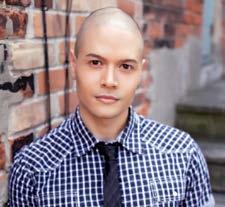
Rogers, and Get Bold
Today with LeGrande Green. He actively writes and speaks about his mother’s journey with cancer and on gender issues in the media.
Two and a half decades of transforming people's bodies and minds taught me that physical health inexorably influences mental health. Further, if you want to persevere in many aspects of your life, first aim for dedication in one. Through deaths and heartaches, failures and setbacks, exercise has been the single, unshakable anchor in my life's many storms. So transitioning from a personal trainer to an author wasn't as awkward a process as you might imagine. I'd already laid the building blocks to measure long-term success through years of physical training and discipline. Moreover, as a man with baseline anxiety, exercise has long satisfied the need to burn off excess agitation. Finally, as someone who has a family history of depression and mental illness, too, exercise provides me with a foundation of positive mental feedback and biochemical adjustments that I couldn't imagine my life without.
Likewise, my dedication to physical fitness has strengthened my writing. When you've established a routine, especially one that involves challenging adversity daily, sitting down and hammering out 2-3 hours of a manuscript on a religious basis becomes second nature. One more keystroke replaces the "one more rep" mantra. Before you know it, you've written 10, 20, then 100K words. For example, I'm currently at 70K words on a manuscript I started on November 7th. Through exercise, we condition ourselves to make slow, meaningful progress. We learn to manage anxiety and expectations. We reward our
brains with regular dopamine drips instead of the well-documented and grossly unhealthy spikes and valleys brought on by social media abuse. Persisting on "boring tasks" breeds more than diligence, contributing to mental cohesion in a psychologically fragmented society.
So my writing habits are much the same as my fitness ones. I have a set time, usually 2-4 am, where I write in the stillness of the hours between night and dawn—a truly mystical and quiet window. I am alone, highly focused, sometimes straining and motivated only by the inevitable result of my exertions. I know that if I complete this one segmented task, it becomes part of the chain of an eventual grand production. Nothing else matters but the hypnotic tapping of my keyboard (I adore a clicky keyboard) and the wandering stream of characters, dialogue and drama in which I'm inevitably swept.
In general, part of the momentum for writing is the suspension of doubt and predictive thought and simply doing the thing. Don't distract yourself with overly loud or even vocal music—classical or instrumental tunes contribute best
to the creative mindset. Don't have the tv or white noise humming in the background. Close the door to your office and shut out the cats if need be—quite the challenge with my gorgeous and precocious darlings! But, above all, sit and do. Don't worry about what's ahead because that won't come without the now.
We spend so much of our lives looking either forward or back. However, life happens in neither of those states. We only experience happiness in the present. I love writing and fitness, and I draw parallels between them because you cannot deny the state of slowing, being, breathing, and weaving a lifelong thread from these pursuits.
You don't need to be a professional or published author to benefit from the freedom and boons of focused expression. So keep a blog or diary. Make an hour to paint, doodle or concentrate on a crossword. Or instead of those activities, get off your butt and do some squats, push-ups or lunges. We only have so much time to live, and regret comes from lives not lived in good health or with meaning.


Just City is an engaging, philosophically oriented YA novel that helps show readers how to find the values that matter the most to them.
The story follows Nathan, a budding young entrepreneur striving to succeed on his own, as he works to earn money to enter a start-up contest. As part of this, he takes part in a virtual reality game, Just City, created by his grandmother, a neuroscience and experimental philosophy professor.

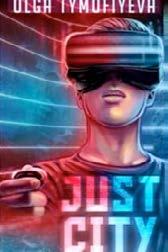 PUBLISHER: OLGA TYMOFIYEVA
PUBLISHER: OLGA TYMOFIYEVA
reevaluate his beliefs.
The game is an experiment in which players determine the rules of a virtual society, such as the boundaries of criminal justice and health care, before being plunged into randomly selected characters from different walks of society. Based on his experiences playing the game, as well as an argument with a friend, Nathan begins to
Narrated by Nathan, the novel does a wonderful job showing the thoughts and feelings of a privileged young man reexamining his views. He begins believing in firm logic and “willpower,” and that the downtrodden simply don’t have the “will” to succeed. Indeed, the app he wants to develop for the contest would prevent homeless people from stealing supermarket shopping carts. In the game, playing a poor young man accused of a terrible crime, he realizes that such people can be trapped through no fault of their own.
The novel also captures the difficulties of extremes. While smart, his friend Jack has no empathy and may have sabotaged Nathan years earlier. Another friend Alex, and Alex’s sister Maria, are kind and friendly, but firmly believe in alternative medicines and not vaccinating their children. It’s fascinating to watch Nathan move from one to the other, while slowly understanding the problems in both and adopting the best parts of each for a value system.
Playwright and actor Carlos Lacámara’s novel, Eliza and the Alchemist, is a mystical, madcap trek through worlds presumably real and realistically etheric, where a young woman becomes the bearer of supernatural powers.

In this far-reaching, light-hearted fantasy, Eliza is an intelligent UCLA student who has been unsuccessful in love or even friendship with men. She ventures into a class in ancient history and folklore taught, once a year, by aging professor Oliver Crowley, who speaks in Latin and advances radical theories that intrigue her.

As Eliza finds herself magnetically drawn to him, she tries to get his attention, finally succeeding by showing him a book written by one of her ancestors that she has surreptitiously taken from her filmmaker father’s library. Crowley is more than impressed. In fact, he disappears with the book.
Trying to track him down, Eliza finds herself in a realm where weird creatures murmur in archaic tongues and the dead may be brought to life. Crowley reveals that the ancestral volume has magical potential and that he and Eliza must now join forces to save the world from evil and destruction.
The story offers a host of deftly drawn, disparate characters, including street criminals, sexual seducers, and mighty moguls in need of being taken down a peg. The seamless narrative is infused with a sly sense of humor. For example, on a third date with a handsome college student, Eliza assesses his worthiness as he ruminates on important world affairs, such as the plight of the Innuit. “He likes Eskimos,” she thinks. “That’s nice. I mean somebody has to…”
Additionally, there’s enough creepiness — blood, vomit, slimy worms and homunculi — to please the most ardent fans of the darker side, and the setting, in and near Hollywood, offers a plethora of opportunities for calamities, changes, and a tinge of romance.
The result is an engaging saga worthy of cinematic treatment. A mysterious ending suggests a sequel, which Lacámara’s audience will anxiously anticipate.
This thrilling, well-executed tale of international espionage pits a small group of independent fighters against a mastermind terrorist.
After the events of Brett Andrew Strange’s former book, Against the Dusk, Katya Volkova is training herself to fight the shadowy villain Perses, who tortured her after killing her family. Her lover, American war veteran Paul Drake, is equally committed to taking down Perses and the hub supporting brutal wars across the Middle East.

Katya and Paul recruit allies in the U.S. government and plot strategy, but Perses and his network of arms dealers, money launderers, smugglers, and spies always seem one step ahead of them. Justice blurs with revenge as Paul’s ragtag group has one last chance to stop Perses and save unknown lives — but the gamble comes at a high price.
The novel globetrots from the deserts of California to the deserts of Syria, from posh avenues in Paris to the ancient streets of Malta, with the action tense and urgent throughout. Employing taut, clean prose and a tightly woven plot, Strange tells a story worthy of the big screen, showing a grasp of global geopolitics as well as fighting tactics, weaponry, and the intelligence world.
Glimpses of glamor and bursts of stunning violence don’t overshadow the layered, likeable characters or the high stakes. Paul has sacrificed ties with all he knows to trust Katya’s handlers, a pair of canny Russians whose motives are never quite clear. Katya is both preternaturally beautiful and highly adept, and ready to give her life to bring down the men who killed her family. The bad guys are dimensional and truly terrifying in their lust for power and love of chaos, yet Strange offers glimpses of beauty and elusive meaning against the backdrop of loss, blood, danger, and sacrifice.
In a crowded genre, Beneath the Purple Dawn is gripping and memorable.

I read Lark Ascending in an afternoon. I can’t remember the last time I read a book in a day.

Silas House tells a story that feels like it’s a few bad steps away at times. Religious nationalists – called Fundies by the main character – have taken over and reshaped America in their image. After a brief respite of freedom living in a small commune in the mountains, Lark and his family flee across the sea to Ireland where they heard they’d be safe. However, only Lark makes it to shore and comes to find the problems he fled from took root there also.
House’s style is incredibly simple, but I never found it bland. I’m a sucker for pithy writing, and even in face of his economy of words, the characters and conflicts in the story felt fully realized. Though the story’s progression was everything I expected, I was engaged throughout and still enjoyed where each turn took me.
The conflicts and themes throughout the story weren’t anything new to anyone entrenched in media – religious fanaticism, climate change, hate – but I don’t think that’s necessarily a bad thing. One of the best things about reading is finding someone who pens a phrase where you can point and say, “See! That’s what I meant.”
House succeeds in this way, with one of my favorite quotes from the novel being “Turns out it’s easy to convert more people to a cause that takes power from others, that thrives on meanness.” As someone raised with ‘Fundie’ ideals, I resonate with these lines because despite the central message of love, a dark underbelly of hate and judgement felt uncomfortably close to those marked as “different.”
As we watch the protests in Iran while others of us live through them, Lark Ascending tells a timely story that’s enjoyable to read. House’s style is clean and fresh, and reading a story that softened the cruelty humanity’s capable of with the beauty it can show was a great way to start the year.
Crystal Wilkinson combines a deep love for her rural roots with a passion for language and storytelling in this compelling collection of poetry and prose about girlhood, racism, and political awakening, imbued with vivid imagery of growing up in Southern Appalachia. In Perfect Black, the acclaimed writer muses on such topics as motherhood, the politics of her Black body, lost fathers, mental illness, sexual abuse, and religion. It is a captivating conversation about life, love, loss, and pain, interwoven with striking illustrations by her long-time partner, Ronald W. Davis.
In this book, Crystal delves into her past, present, and future as a Black woman living in the South. She grapples with her body and sexuality, namely losing and reclaiming them, and confronts the aching truth of her enslaved heritage. However, in the midst of all this pain, Crystal also writes about love and hope – for her family, for her rural upbringing, and for little Black girls everywhere. This collection was absolutely riveting to read, and I feel that Ronald Davis’s sketches and collages pair well with Crystal’s work.

I especially love the way that Crystal describes her lineage of cooking, and how she feels the ghosts of her ancestors guiding her as she works in the kitchen. Food is such a large component of culture, of home, of family. It’s a part of your history, and soon you’ll become history, guiding your children and great-grandchildren as they cook. As a person of Middle Eastern heritage, I really connected with Crystal’s description of this culinary “circle of life.”
Overall, I thought Crystal’s debut poetry collection was phenomenal, and I look forward to reading her forthcoming work – especially Praise Song for the Kitchen Ghosts, her culinary memoir (Clarkson Potter/Penguin Random House, publication date tbd).
Late in the novel Mille McDine, the eponymous character of the novel references a tantrum by a young boy and says, “I wonder how you would behave if your life had been turned upside down.” It makes sense that Millie says this, as the life she’s been granted Is repeatedly turned over and stomped on. Abandoned as a baby by both her mother, Sadie, and father, Joseph, she’s left to be raised by her grandmother, who does her best for Millie before falling ill. However, her grandmother’s “best” includes placing Millie in the dangerous position of being repeatedly assaulted by a neighbor boy. When Millie’s grandmother dies, Millie learns the truth about her mother—that she’s alive—and upon her return, Millie hopes that Sadie will save her. But that’s not to be. Both naïve and ill-informed and once again ignored by her mother, Millie looks for love and comfort elsewhere and soon finds herself pregnant and alone. What comes to pass is even more turbulence: Millie’s baby is taken without her consent, and she’s placed in a mental asylum. Though she eventually escapes, her upside-down life isn’t finished with her.
Author Margaret Scrowther has stated that the book was inspired by her own “chequered past,” and it certainly can serve as a cautionary tale for teenagers and adults alike. Because Millie lacked the necessary familial and social support to thrive— something she had no control over—she also lacked the ability to be thoughtful. Millie never had the opportunity to learn from a proper role model, which resulted in a long list of bad decisions. Had Millie known how to lessen some of her impulsivity, she might have found herself in a different place. This book doesn’t sport a trigger warning, but readers should be aware of its heavy content and depiction of violence, drugs, rape, and assault.

Ellen Nichols released Remember Whose Little Girl

You Are in May 2022. This book is a memoir about growing up in the Deep South during the 1950s and 1960s.
After moving to Toronto, Ellen attended graduate school. Eventually she got married, had children, and stayed for 50 years before returning to her southern roots. The 116 pages of this memoir dive into Ellen’s childhood and early young adult years.
Having written three short memoirs myself, I was interested in reading this one. The title alone grabbed me, but as I started reading it, I found myself fully immersed in Ellen’s stories right away. She writes each chapter as a short story. Some of them were a few pages long while others were only a couple of pages. In each chapter, she packs each of them with enough details to give us a clear picture of what happened at that point in her life.
To say Ellen is a great storyteller is almost an understatement. Not only does she write with such detail, but she tells a variety of stories as well. As I read through each chapter, I could be on the verge of tears one minute and laugh in the next. Since she was a pastor’s daughter, Ellen tells some interesting stories, and I could certainly relate to some of them since I once had a friend whose father was a pastor. Ellen’s stories are even more intriguing to those who enjoy history, and I am certainly one of them. I have only visited the south, so I could only imagine what it would have been like to have lived there during these turbulent years. While I am not as old as Ellen, reading Remember Whose Little Girl You Are made me think of my own childhood memories of moving around and being the new kid. If you enjoy stories about childhood memories and history, I highly recommend reading this memoir.
Released on January 10, Mandate: Thirteen is Joseph Dowling’s first novel. He has previously written and published several short stories.
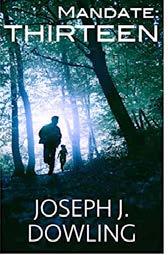
With birth rates dropping, girls must do a fertility check once they turn thirteen. Hope is no exception, and when her mother tries to sell her to the Baby Farmers instead of seeing if she would go to a birthing school, Hope’s father Michael makes a quick decision to save Hope’s life.
While Mandate: Thirteen is considered a dystopian thriller, it felt more true to life than that genre, especially since it is set only a few years in the future. I do enjoy reading thrillers and will occasionally read a dystopian novel, but the two genres thrown together made for an interesting book. I had a hard time putting it down once I got a couple of chapters in. Joseph kept the action rolling for the most part. Just a word of caution for those who don’t like violence or profanity, this book does have some of each, but I think both make the book more real.
PUBLISHER: MANTRA PRESS
Even though I had a hard time putting the book down most of the time, there was a couple of times that I got lost. While Michael and Hope are on their adventure, I got a little confused about the two groups who were searching for them. There were several minor characters, and it was a bit hard to keep track of who belonged to which group. However, I pushed past those moments and continued on with the story. Did it really matter which group that character belonged to? No, it didn’t because they were all searching for the father and daughter.
Overall, Mandate: Thirteen reminded me of A Handmaid’s Tale and maybe even 1984 in certain ways. So, if either of those novels are ones you enjoyed, you will want to read this one.
John Elizabeth Stinzi really let themselves run wild with their latest novel, My Volcano.

It’s like a bag of narrative confetti, handfuls taken out and thrown over you as you are pulled along page by page. You catch fleeting colors of people’s stories fluttering by you, some recurring, others one offs where you wonder what their purpose, their utility was in the greater narrative. And I believe this is intentional.
The reader is quickly introduced to a cast of characters and something bizarre happening, which is a sign of what’s to come. As a volcano begins growing out of New York City, we’re introduced to a character who works at a place called “Easy-Rupt” where people can safely let their emotions out, another’s a homeless man down on his luck, another’s a man slowly being turned into a thistle, while another is simply referred to as “the white trans writer.” And this is only the tip of the iceberg.
What pulled me in initially is how real the story felt. A volcano was erupting from Central Park, and within days, people forgot about it after a flurry of media activity. People continued on in their struggles – breakups, making ends meet, battling against an inner critic – these all felt more mountainous to them than a volcano part way across the world or in their backyard. It’s like that with all of us. For many of us who are honest with ourselves, the war in Ukraine is frequently a blip on our awareness that disappears when more pressing questions appear like “what’s for dinner?”
Even as My Volcano departs from its tenuous hold on realism, it remains remarkably approachable, despite the structure being confounding at times. The writing is succinct and grounded, which kept me coming back to the novel after I set it down to wonder digest it and wonder what I missed between chapter 62 and 63.
It’s unlike anything I’ve ever read. It’s bizarre, pithy, candid, and artistic. If you willing to see where Stinzi takes you, My Volcano is certainly worth the ride.
PUBLISHER: ARSENAL PULP PRESSWendy Wimmer’s debut short story collection, Entry Level, contains a range of characters who are trying to find, assert, or salvage their identities. These fifteen stories center around the experience of being underemployed—whether by circumstance, class, gender, race, or other prevailing factors—and the toll this takes on an individual…. Her characters undergo feats of endurance, heartbreak, and loneliness, all while trying to succeed in a world that so often undervalues them. From a young marine biologist suffering from imposter syndrome and a haunting to a bingo caller facing another brutal snowstorm and a creature that may or may not be an angel, Wimmer’s characters are all confronting an oppressive universe that seemingly operates against them or is, at best, indifferent to them. These stories reflect on the difficulties of modern-day survival and remind us that piecing together a life demands both hope and resilience. Published in September 2022 by Autumn House Press, Entry Level is Wendy Wimmer’s debut short story collection.

This collection shines with stunning prose, compelling characters, and a sharp wit. Every story and every character, despite the book’s magical undertones, feels real – as if Wimmer reached directly into a pot and pulled out what is, what was, and what could’ve been. Her words and metaphors are the sort you roll around in your head after reading, enjoying the taste of them. And I quite enjoyed the magical elements of the book – magical realism is my favorite genre, and Wimmer certainly delivered. Of the collection, my absolute favorite stories were Ghosting, Where She Went, Flarby, and The Bog King.
As an underemployed person myself, I was able to relate to many of the characters and their circumstances … I felt a little too seen, if you know what I mean, but that isn’t necessarily a bad thing. I think it’s good to feel vulnerable when reading. With that in mind, I look forward to reading anything and everything Wendy writes in the future! She’s incredibly talented, and she’s just getting started.
PUBLISHER: AUTUMN HOUSE PRESS

Nobody loves books more than us. We're a team of readers with broad interests and strong feelings about the books on our shelves.
 by Bob Mayfield
by Bob Mayfield
A writer terrifies a small town. A Major League baseball player consults the Buddha. A woman disappears in front of the cameras. A cat whistles. The husband of a writer gets a lifealtering makeover in his wife’s comic strip. A man discovers he’s the Baron of a vanished country, only to get entangled in an assassination plot with international ramifications, from Oslo to Paris, from Santa Fe to Pakistan.
Set in the fictional realm of Haven, New Connecticut, during the Great Recession of 2011, the thirty-six stories gathered here ensconces the reader in the middle of a world both recognizable and unsettling.
For the past fifteen years, Commander Ian Philips with the help of thousands of others; choosing the best in each field designed and built Parallax, an enormous Space Station and the Deep Light device. The Parallax space station is located in the void between Ganymede and Callisto, two of Jupiter’s moons and orbits the colossal planet every fifteen days. From the top or bottom view, the Parallax space station, resembles a pair of eyeglasses with Deep Light star shaped object directly in the middle. Parallax and Deep Light were developed and designed to generate and contain a small controllable black hole to study and maybe for the first time shine a Deep Light into the void. However, things go array from the start and what they may have done is opened an unimaginable nightmare to Hell.
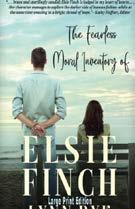 Lynn Byk
Lynn Byk
 Robert Kalich
Robert Kalich
There’s a filigree setting for every family secret. What Elsie covets is the truth. Consequences come with being an heir of the Finch family estate, consequences no one bargained for.
Richard and Gail Finch designed their estate to carry ramifications for misplaced loyalties, but there are results neither one contemplated. When the third generation aims for a cache of treasure, someone is expendable.
VENGEANCE!!! That’s what the regent of Brashnor swore, as the drones left his city in ruins.... There’s nowhere in the entire galaxy, that they’ll be safe from the mighty Kraaglor Front. Especially from its general: the ruthless Voch! RETALIATION...! Jack quickly becomes the target of a relentless hunt. And immediately learns that there are enemies more worst than the Seezhukans; and adversaries more formidable than the legendary Drofh. An enemy, who will bring total annihilation to entire sectors. And cause the mighty Stendaaran general to flee for his life! RESOLUTION...! There’s no defeating Voch! Only one course of action could bring a cease to all of this madness now! One that will pull them all into a different dimension. And it is here, where new alliances are formed; and new enemies are discovered. An enemy, that’s even more powerful than general Voch!
SOUTHLAND is a cozy mystery. The main character is John Lynch who is very intelligent and is thought to have a photographic mind. His father and father’s partner had a very successful construction company and are now retired. Another contractor wanted the construction of Southland stopped. He had the tower crane sabotaged in hopes of stopping construction and forcing the construction owner into bankruptcy. The owner of the construction company is killed and there is no-one to finish the building.
ref=sr_1_1?crid=2I6ARAQZT5BP
Untying the family Finch saga with blistering tales, Richard and Gail’s unscrupulous affections span the geography of San Francisco Bay, Phoenix Arizona, Oklahoma City, and finally slip into the shadow of the Rockies. Will someone pay for the past? Who wins in this long game, and what remains?
ref=sr_1_1?crid=2I6ARAQZT5BP
N&keywords=jack+dillon+into+th
Facing the idiosyncrasies of his life and character, David Lazar mercilessly analyses his success. Can we accept irreconcilable contradictions? Can people change? And what does it mean to be human? Peeling layers of conventions and domestication, Lazar is gradually facing the man he once was, his past emotionless and cold existence. He cannot help but wonder: is he still that man or has the love of his wife redeemed him? Can writing his life storypurge his flaws? The puzzle of life’s inconsistencies grows as Lazar is baffled by his clandestine meetings in his NYC penthouse with Duck, the US president. The two of them mirror all that is opposed in American society and echo the doubt whether these dividing gaps can be bridged.The fragility of existence is further exacerbated by the spread of Covid-19. The presence of death is more tangible than ever.
The two retired partners decided to come out of retirement to help finish the Southland Office Building in Richmond Virginia. While the four friends conduct the investigation they also managed to start and build their own businesses, find love and reflect back on their friendships

For the past fifteen years, Commander Ian Philips with the help of thousands of others; choosing the best in each field designed and built Parallax, an enormous Space Station and the Deep Light device. The Parallax space station is located in the void between Ganymede and Callisto, two of Jupiter’s moons and orbits the colossal planet every fifteen days. From the top or bottom view, the Parallax space station, resembles a pair of eyeglasses with Deep Light star shaped object directly in the middle. Parallax and Deep Light were developed and designed to generate and contain a small controllable black hole to study and maybe for the first time shine a Deep Light into the void. However, things go array from the start and what they may have done is opened an unimaginable nightmare to Hell.

VENGEANCE!!! That’s what the regent of Brashnor swore, as the drones left his city in ruins.... There’s nowhere in the entire galaxy, that they’ll be safe from the mighty Kraaglor Front. Especially from its general: the ruthless Voch! RETALIATION...! Jack quickly becomes the target of a relentless hunt. And immediately learns that there are enemies more worst than the Seezhukans; and adversaries more formidable than the legendary Drofh. An enemy, who will bring total annihilation to entire sectors. And cause the mighty Stendaaran general to flee for his life! RESOLUTION...! There’s no defeating Voch! Only one course of action could bring a cease to all of this madness now! One that will pull them all into a different dimension. And it is here, where new alliances are formed; and new enemies are discovered. An enemy, that’s even more powerful than general Voch!
SOUTHLAND is a cozy mystery. The main character is John Lynch who is very intelligent and is thought to have a photographic mind. His father and father’s partner had a very successful construction company and are now retired. Another contractor wanted the construction of Southland stopped. He had the tower crane sabotaged in hopes of stopping construction and forcing the construction owner into bankruptcy. The owner of the construction company is killed and there is no-one to finish the building.
The two retired partners decided to come out of retirement to help finish the Southland Office Building in Richmond Virginia. While the four friends conduct the investigation they also managed to start and build their own businesses, find love and reflect back on their friendships

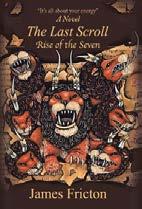 by James Fricton
by James Fricton
A chance meeting with an old classmate leads Ryan Laughlin, a dedicated young physician, to an ancient Roman spa in a medieval village of Italy where researchers are studying two remarkable events that could change the course of history & mdash; a new technology that claims to measure the essence of life itself, the human spirit, and the final Dead Sea Scroll which was recently discovered in the West Bank. The Last Scroll reveals universal truths about the nature of life through Seven Blessing but warns of Seven Plagues of the Beast that are emerging this century causing alarm and protests around the world. While visiting the spa to learn these secrets and enjoy the food, wine, and culture of Italy, Ryan finds himself the target of a killer who claims the project is heresy and will do anything to stop it.
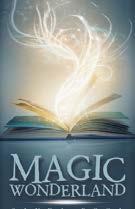 Boca
Boca
My mom used to tell us, to me and my sister, stories about the heroes of the legends and their mythical animals. As a young child, I read many fairy tales. I was always amazed of their world. And then I started to wonder if they were only fantasy. I travelled inside these stories throughout my mind, and the more I read, the more they seemed real to me. I felt alive just imagining that I am a part of their world, where I was always welcomed by everything and everybody. My sister was always my companion in all my travels, and she always took good care of me.
Before I knew it, I grew up and I was blessed with a wonderful child. His innocence and beautiful heart reminded me of our childhood where innocence was the name of our world. My son was and is an inspiration for a fantasy world of my own. Just for my him, I decided to bring the myths and legends into our world. I decided to give them life.
 Paula Diggs
Paula Diggs
Take a trip from the surf In Southern California to the gold country of Alaska when two super sleuths are captured by weird forces. They become the power of good over evil. A horrific crash from someone’s nightmare opens doors in a deserted mansion they pass on their way home from school. These sleuths are joined by four curious kids and the fun begins. They bring terrible criminals to justice and take a wild ride in a luxury motor home to an Inuit village in Alaska.
After a struggle these kids use fearless insights and talents to turn a haunted deserted mansion into a home. In the end three of these heroes and one heroine gear up their abilities for Middle school as the others including the parents cheer them on.
For the past fifteen years, Commander Ian Philips with the help of thousands of others; choosing the best in each field designed and built Parallax, an enormous Space Station and the Deep Light device. The Parallax space station is located in the void between Ganymede and Callisto, two of Jupiter’s moons and orbits the colossal planet every fifteen days. From the top or bottom view, the Parallax space station, resembles a pair of eyeglasses with Deep Light star shaped object directly in the middle. Parallax and Deep Light were developed and designed to generate and contain a small controllable black hole to study and maybe for the first time shine a Deep Light into the void. However, things go array from the start and what they may have done is opened an unimaginable nightmare to Hell.
Madrinega, Central America, 1983: In this thriller of intrigue and guerilla warfare, Leighton, an American agent, poses as a left-wing journalist to infiltrate a guerilla movement fighting to topple Madrinega’s repressive dictator Eduardo Vilar at the height of America’s war against the Sandinistas in neighboring Nicaragua. His mission: Locate and recover four cruise missiles seized by the guerillas in a bloody attack on a military base. Leighton is nearly killed while pursuing a story about the brutal government bombing of a village with no known ties to the guerillas. Antagonizing Vilar’s regime with his news stories, he is soon arrested and tortured by the Secret Police, then released only to be given an ultimatum: Leave the country or be “disappeared.”


VENGEANCE!!! That’s what the regent of Brashnor swore, as the drones left his city in ruins.... There’s nowhere in the entire galaxy, that they’ll be safe from the mighty Kraaglor Front. Especially from its general: the ruthless Voch! RETALIATION...! Jack quickly becomes the target of a relentless hunt. And immediately learns that there are enemies more worst than the Seezhukans; and adversaries more formidable than the legendary Drofh. An enemy, who will bring total annihilation to entire sectors. And cause the mighty Stendaaran general to flee for his life! RESOLUTION...! There’s no defeating Voch! Only one course of action could bring a cease to all of this madness now! One that will pull them all into a different dimension. And it is here, where new alliances are formed; and new enemies are discovered. An enemy, that’s even more powerful than general Voch!
ref=sr_1_1?crid=2I6ARAQZT5BP
N&keywords=jack+dillon+into+th
Northwest Illinois, 1885. Mitch and Andy Jensen’s Adventure in the Haunted Woods will teach them lessons of God’s unconditional love and His perspective about vampires and zombies. Do they really exist? A violent storm causes school to close early, and Mitch and Andy find themselves taking a shortcut through the haunted woods to get home. Ignoring the legends that say the woods are filled with vampire zombies, they stumble upon an old miner’s cabin deep in the woods. Thinking they found shelter from the storm, they are scared off when they see glowing red eyes staring at them from inside. Mitch and Andy’s Adventure in the Haunted Woods teaches all those involved, including the reader that God goes with us when we are afraid and that He loves us so much that he made a way for us to be at His final roundup feast.
In Black and Female, Tsitsi Dangarembga examines the legacy imperialism on her own life and on every aspect of black embodied African life.

SOUTHLAND is a cozy mystery. The main character is John Lynch who is very intelligent and is thought to have a photographic mind. His father and father’s partner had a very successful construction company and are now retired. Another contractor wanted the construction of Southland stopped. He had the tower crane sabotaged in hopes of stopping construction and forcing the construction owner into bankruptcy. The owner of the construction company is killed and there is no-one to finish the building.
The two retired partners decided to come out of retirement to help finish the Southland Office Building in Richmond Virginia. While the four friends conduct the investigation they also managed to start and build their own businesses, find love and reflect back on their friendships
This paradigm-shifting essay collection weaves the personal and political in an illuminating exploration of race and gender. Dangarembga recounts a painful separation from her parents as a toddler, connecting this experience to the ruptures caused in Africa by human trafficking and enslavement. She argues that, after independence, the ruling party in Zimbabwe only performed inclusion for women while silencing the work of selfactualized feminists. She describes her struggles to realize her ambitions in theater, film, and literature, laying out the long path to the publication of her novels.
What is the point of nightmares when your reality is just that; a horror flick directed by those you were taught to trust and born to love. In the town of Portland, Maine a child by the name of Sarah Lee lived with secrets no one in her neighborhood knew of, because instead of calling on a neighbor, a teacher, or even a police officer she called on God only for her cry for help to fall upon deaf ears. With no other choice, at an early age she made the decision to run away from home, but not until after she made her mark. During her escape she found herself lost and runs into a beautiful, but conniving woman with no honorable deeds on her conscience.
Read along as deception turns a gorgeous girl with all the potential in the world into... Wouldn’t you like to know?

A chance meeting with an old classmate leads Ryan Laughlin, a dedicated young physician, to an ancient Roman spa in a medieval village of Italy where researchers are studying two remarkable events that could change the course of history & mdash; a new technology that claims to measure the essence of life itself, the human spirit, and the final Dead Sea Scroll which was recently discovered in the West Bank. The Last Scroll reveals universal truths about the nature of life through Seven Blessing but warns of Seven Plagues of the Beast that are emerging this century causing alarm and protests around the world. While visiting the spa to learn these secrets and enjoy the food, wine, and culture of Italy, Ryan finds himself the target of a killer who claims the project is heresy and will do anything to stop it.
 by Harry Katzan Jr.
by Harry Katzan Jr.
My mom used to tell us, to me and my sister, stories about the heroes of the legends and their mythical animals. As a young child, I read many fairy tales. I was always amazed of their world. And then I started to wonder if they were only fantasy. I travelled inside these stories throughout my mind, and the more I read, the more they seemed real to me. I felt alive just imagining that I am a part of their world, where I was always welcomed by everything and everybody. My sister was always my companion in all my travels, and she always took good care of me.
Before I knew it, I grew up and I was blessed with a wonderful child. His innocence and beautiful heart reminded me of our childhood where innocence was the name of our world. My son was and is an inspiration for a fantasy world of my own. Just for my him, I decided to bring the myths and legends into our world. I decided to give them life.
This is a collection of three stories that center around the worldwide pandemic episode that centers around the COVID virus that paralyzed the world. Many people died. Many people were confined to a hospital bed, and others had to shelter in place. Schools were conducted from hoe using a virtual classroom. Thousands of businesses failed and countless persons were out of employment. The worlds scientific community came to the rescue and developed an antidote to forestall the virus and return civilization to a meaningful level. We, as a worldwide community, have survived and we will escape as a better world. The main characters are Matt, the mathematician, the General, a worldwide benefactor, and other people, such as Ashley, Anna, and Sir Charles (Buzz) Bunday. There are three novels: The Virus, Then Pandemic, and the Vaccine. You will be enlightened and entertained. You can read the novels in any order, without a loss of continuity.
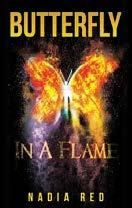
Take a trip from the surf In Southern California to the gold country of Alaska when two super sleuths are captured by weird forces. They become the power of good over evil. A horrific crash from someone’s nightmare opens doors in a deserted mansion they pass on their way home from school. These sleuths are joined by four curious kids and the fun begins. They bring terrible criminals to justice and take a wild ride in a luxury motor home to an Inuit village in Alaska.
After a struggle these kids use fearless insights and talents to turn a haunted deserted mansion into a home. In the end three of these heroes and one heroine gear up their abilities for Middle school as the others including the parents cheer them on.
A fire is a thermal process of a decomposition reaction where oxygen oxidizes a fuel. A complex phenomenon that relies on a vary of chemical reactions. Those chemical reactions triggered by daily life events of three beautiful and smart young women raised in the South to grow a future in San Diego. Zola Saunders, a marketing coordinator, battles for a promotion when she meets a new love interest. Hoping to end her scandalous ways with a handsome business owner, the past creeps back in, disordering her thought process. Lynn Comeaux, a nursing school student, who juggles a married man with a dying wife and a boy toy from school. Never believing in love because of her sordid family’s history, opens her heart to the possibilities. Kyla Lachance, partner of a major law firm, enjoys married life with her son. However, when stress becomes to much, she ventures in desired waters and finds herself in an entanglement with a handsome grey-eyed twin. Which unlucky woman gets caught up in the depths of the fire and lose her life in the process?
Two lovers crest the wave of the golden age of Athens: Pericles, statesman and general, and Aspasia, his courtesan, a philosopher’s daughter and a brilliant woman in her own right. Their love transcends social sanctions, enduring and deepening despite the grave threat it presents to Pericles’ reputation as a leader of the Athenian democracy.
The novel unfolds against the background of the arts and history of the Golden Age seen through the eyes of two individuals who lent their particular brilliance to make it “golden,” Pericles, the great orator and visionary of democracy and its most influential woman, Aspasia.

For the past fifteen years, Commander Ian Philips with the help of thousands of others; choosing the best in each field designed and built Parallax, an enormous Space Station and the Deep Light device. The Parallax space station is located in the void between Ganymede and Callisto, two of Jupiter’s moons and orbits the colossal planet every fifteen days. From the top or bottom view, the Parallax space station, resembles a pair of eyeglasses with Deep Light star shaped object directly in the middle. Parallax and Deep Light were developed and designed to generate and contain a small controllable black hole to study and maybe for the first time shine a Deep Light into the void. However, things go array from the start and what they may have done is opened an unimaginable nightmare to Hell.
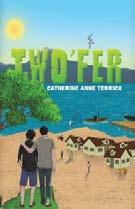 Anne Terrick
Anne Terrick
Noah and Kaleb are best friends growing up in hard times. They live on adjoining farms, and both families are suffering greatly. Kaleb’s dad has died, leaving Kaleb to take on the role of the provider at just seventeen years of age; the weight of caring for his five siblings and his mom is staggering. Noah, at only fourteen, has witnessed the daily verbal and physical abuse of his mother at the hands of his drunken step-dad.
VENGEANCE!!! That’s what the regent of Brashnor swore, as the drones left his city in ruins.... There’s nowhere in the entire galaxy, that they’ll be safe from the mighty Kraaglor Front. Especially from its general: the ruthless Voch! RETALIATION...! Jack quickly becomes the target of a relentless hunt. And immediately learns that there are enemies more worst than the Seezhukans; and adversaries more formidable than the legendary Drofh. An enemy, who will bring total annihilation to entire sectors. And cause the mighty Stendaaran general to flee for his life! RESOLUTION...! There’s no defeating Voch! Only one course of action could bring a cease to all of this madness now! One that will pull them all into a different dimension. And it is here, where new alliances are formed; and new enemies are discovered. An enemy, that’s even more powerful than general Voch!
 Jessop
Jessop
At the end of his working life, a vicar in the City of London thinks of himself as a failure: no one now seems to treasure the beliefs and religious practices of his youth; the church hierarchy is seemingly obsessed only with modern marketing and business methods which he doesn’t appreciate; and any love between him and his wife has long since vanished.
ref=sr_1_1?crid=2I6ARAQZT5BP
N&keywords=jack+dillon+into+th
They realize that life on the farm is not an option. They must go where the jobs are. They must secure jobs as fishermen. Trouble is, they have no money, no supplies, and have never been past their own gates. Noah full of youthful exuberance and is eager to begin their adventure, while Kaleb has reservations. After danger and exhaustion threaten their progress, they finally arrive at the village and secure jobs on a boat. Their happiness is shattered when tragedy strikes.
SOUTHLAND is a cozy mystery. The main character is John Lynch who is very intelligent and is thought to have a photographic mind. His father and father’s partner had a very successful construction company and are now retired. Another contractor wanted the construction of Southland stopped. He had the tower crane sabotaged in hopes of stopping construction and forcing the construction owner into bankruptcy. The owner of the construction company is killed and there is no-one to finish the building.
Lacking any personal ambition, he takes on a rundown church and conducts his ministry there in the only way he knows: with understanding, compassion and Christian forgiveness. But in a few short months, the very building and its circumstances change him and his wife forever.
The two retired partners decided to come out of retirement to help finish the Southland Office Building in Richmond Virginia. While the four friends conduct the investigation they also managed to start and build their own businesses, find love and reflect back on their friendships
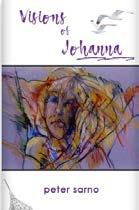
Johanna, an artist, and Matt, a music critic, couldn’t be more different, but by a simple twist of fate, she plucks him from a crowd at a Dylan concert. What follows is a heady and intense relationship buffeted by the usual suspects that gently rocked the ‘80s. Matt’s lessons in art—as well as life—at the hands of Johanna, drive the novel into pockets of feminism and quiet revolution. All of this is tempered by deeply held traumatic secrets that torque their intimacy.
A chance meeting with an old classmate leads Ryan Laughlin, a dedicated young physician, to an ancient Roman spa in a medieval village of Italy where researchers are studying two remarkable events that could change the course of history & mdash; a new technology that claims to measure the essence of life itself, the human spirit, and the final Dead Sea Scroll which was recently discovered in the West Bank. The Last Scroll reveals universal truths about the nature of life through Seven Blessing but warns of Seven Plagues of the Beast that are emerging this century causing alarm and protests around the world. While visiting the spa to learn these secrets and enjoy the food, wine, and culture of Italy, Ryan finds himself the target of a killer who claims the project is heresy and will do anything to stop it.
This north shore backdrop brings Matt into full focus – a child in a city of recent immigrants, life by the ocean, the bilious flavor of the Mob are just some of the elements rendered in skillful detail.
Johanna, a renegade from Wisconsin—freewheeling and hyper-energized—draws Matt out of his comfort zone and into her world. A meditation on art and unrest, Visions of Johanna celebrates life, love, memory and the undying power of the deep connections that sustain us.
 Boca
Boca
My mom used to tell us, to me and my sister, stories about the heroes of the legends and their mythical animals. As a young child, I read many fairy tales. I was always amazed of their world. And then I started to wonder if they were only fantasy. I travelled inside these stories throughout my mind, and the more I read, the more they seemed real to me. I felt alive just imagining that I am a part of their world, where I was always welcomed by everything and everybody. My sister was always my companion in all my travels, and she always took good care of me.
Joe Ecks: X Band’s Rock and Roll Guitarist. Though a musical genius, he’s tortured and miserable under the demands of the industry. Dogged by bad headaches and other ailments, Joe erupts in violent outbursts. Ultimately (on page 1), Joe has a breakdown that results in a complete personality change. Joe now thinks of himself as Mike Smith: Harvard Grad. Mike Smith is the opposite of Joe Ecks in nearly every way; he’s no musical genius, and he can’t play guitar, but he loves being a rock star. ‘Xylene X Band’ is the story of how the New Joe learns to live Joe’s life, and, to a certain degree, how Joe’s life adapts to his new personality. But to truly live Joe’s life, New Joe must develop the skills, and they will be severely tested by the upcoming ‘Xylene’ tour. New Joe is no Old Joe, and X Band desperately needs Old Joe to return.
Unrequited love, losing what might have been and visiting memories of what was; are frequently parts of our human experience. In ‘I messaged My Ex’, Field’s moments are captured with a rawness that shares real insights to the feelings and internal tension in that ‘stew of a process’ and for many readers, a lens that they see their own experiences and journeys within.
Take a trip from the surf In Southern California to the gold country of Alaska when two super sleuths are captured by weird forces. They become the power of good over evil. A horrific crash from someone’s nightmare opens doors in a deserted mansion they pass on their way home from school. These sleuths are joined by four curious kids and the fun begins. They bring terrible criminals to justice and take a wild ride in a luxury motor home to an Inuit village in Alaska.
‘I messaged My Ex’ walks through the ‘stew of the process’ with all the moments mentioned and more. While the pictures draw the reader to their own contemplation the process accelerates, moving from loss to releasing, accepting and turning from the past to futures unknown.
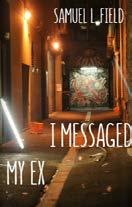
After a struggle these kids use fearless insights and talents to turn a haunted deserted mansion into a home. In the end three of these heroes and one heroine gear up their abilities for Middle school as the others including the parents cheer them on.
Or do they?
Before I knew it, I grew up and I was blessed with a wonderful child. His innocence and beautiful heart reminded me of our childhood where innocence was the name of our world. My son was and is an inspiration for a fantasy world of my own. Just for my him, I decided to bring the myths and legends into our world. I decided to give them life.
A book for anyone who has lost love, or for friends who are facing that journey, another Field book of facing yourself, being


“That’s the thing about books. They let you travel without moving your feet.”
– JHUMPA LAHIRI IN THE NAMESAKE
SHELF UNBOUND WHAT TO READ NEXT IN INDEPENDENT PUBLISHING
WWW.SHELFMEDIAGROUP.COM
